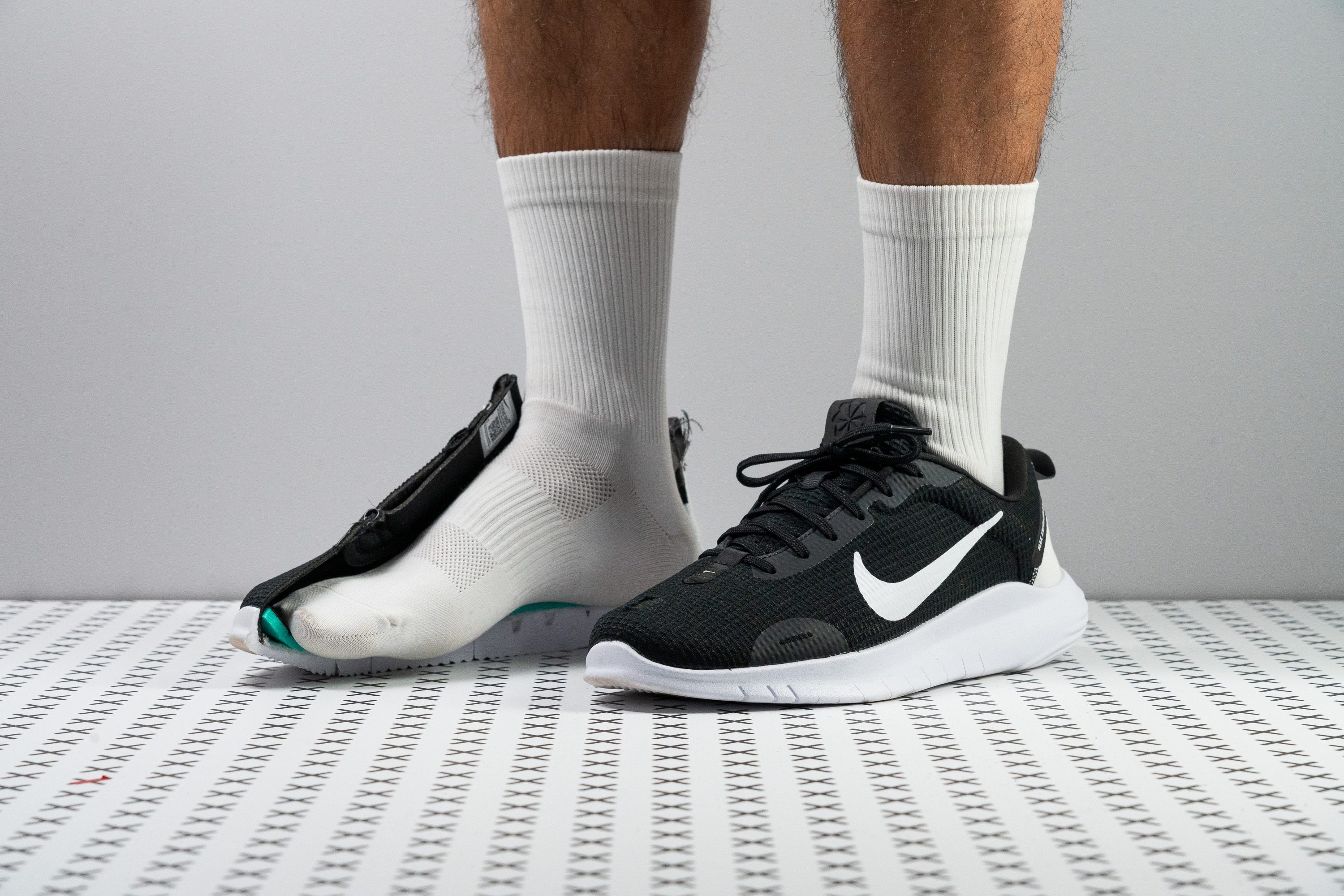Our verdict
Pros
- Flexible, natural-feeling ride
- Enhanced ground feel
- Roomy, comfortable upper
- Super affordable price
- Still lightweight
- Ideal for gym workouts
- Beginner-friendly
Cons
- Minimal, firm cushioning
- Unsuitable for long runs
- Limited outsole durability
Audience verdict
Comparison
The most similar running shoes compared
+ + Add a shoe | |||||
|---|---|---|---|---|---|
| Audience score | 75 Bad! | 89 Great! | 80 Good! | 74 Bad! | |
| Price | $75 | $140 | $80 | $100 | |
| Pace | Daily running | Daily runningTempo | Daily running | Daily running | |
| Shock absorption | Low | Low | - | Low | |
| Energy return | Low | Low | - | Moderate | |
| Traction | Moderate | Moderate | - | Moderate | |
| Arch support | Neutral | Neutral | Neutral | Neutral | |
| Weight lab Weight brand | 8.5 oz / 241g 8.5 oz / 240g | 8.5 oz / 240g 8.1 oz / 229g | 11.1 oz / 316g 11 oz / 312g | 6.9 oz / 197g | |
| Lightweight | ✓ | ✓ | ✗ | ✓ | |
| Drop lab Drop brand | 6.0 mm 6.0 mm | 10.1 mm 6.0 mm | 8.1 mm | 6.9 mm | |
| Strike pattern | Mid/forefoot | Heel | HeelMid/forefoot | Mid/forefoot | |
| Size | True to size | True to size | Slightly large | True to size | |
| Midsole softness | Firm | Firm | Balanced | Balanced | |
| Difference in midsole softness in cold | Small | Small | Small | Small | |
| Toebox durability | Decent | Decent | Decent | Good | |
| Heel padding durability | Good | Bad | Good | Good | |
| Outsole durability | Bad | Good | Good | Good | |
| Breathability | Moderate | Moderate | Moderate | Warm | |
| Width / fit | Medium | Medium | Medium | Wide | |
| Toebox width | Medium | Wide | Medium | Wide | |
| Stiffness | Flexible | Moderate | Stiff | Flexible | |
| Torsional rigidity | Flexible | Flexible | Flexible | Flexible | |
| Heel counter stiffness | Flexible | Flexible | Flexible | Flexible | |
| Heel lab Heel brand | 25.9 mm | 27.9 mm 28.0 mm | 26.4 mm | 25.6 mm | |
| Forefoot lab Forefoot brand | 19.9 mm | 17.8 mm 22.0 mm | 18.3 mm | 18.7 mm | |
| Widths available | NormalWideX-Wide | Normal | Normal | NormalWide | |
| Orthotic friendly | ✓ | ✓ | ✓ | ✓ | |
| Season | All seasons | All seasons | All seasons | All seasons | |
| Removable insole | ✓ | ✓ | ✓ | ✓ | |
| Ranking | #362 Bottom 5% | #87 Top 23% | #312 Bottom 18% | #375 Bottom 2% | |
| Popularity | #62 Top 17% | #101 Top 27% | #190 Top 50% | #262 Bottom 31% |
Who should buy
We think the Nike Flex Experience Run 12 is an awesome option for budget-minded runners seeking a versatile, comfortable shoe. Here's why:
- Those seeking a flexible shoe for occasional runs and everyday wear will love how easily it doubles as a sneaker and its roomy upper.
- If you're not prone to rapid outsole wear, this shoe offers a comfrotable ride at a very low price.
- Runners searching for a minimalist feel without committing to a zero-drop will appreciate the Flex Experience Run 12's 6-mm offset.
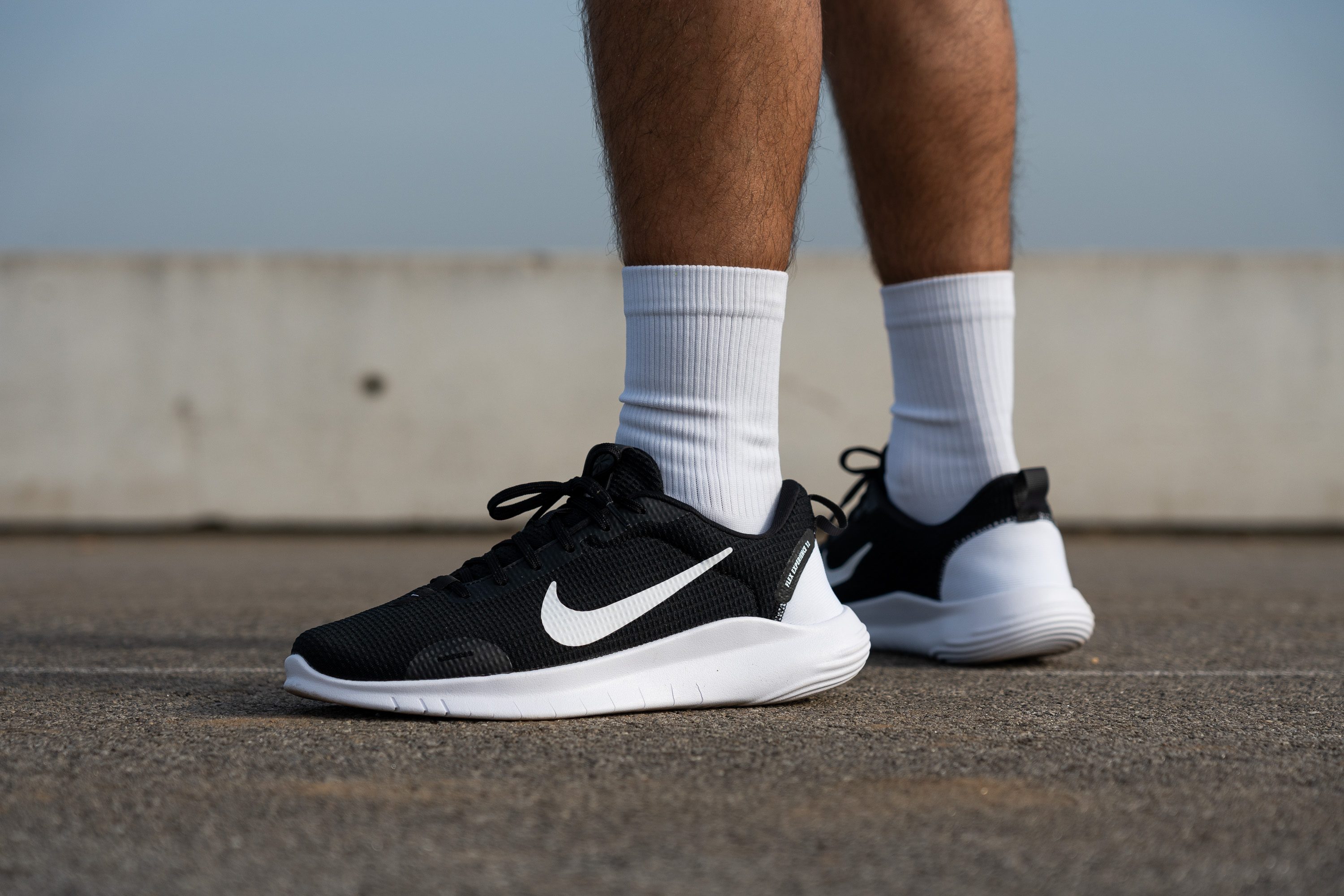
Who should NOT buy
We loved how flexible and versatile the Flex Experience Run 12 is for everyday use, but there's no denying its outsole feels pretty fragile.
If durability is a major concern for you, we think the Adidas Ultraboost 1.0 is a great alternative. It offers a similar height and comfort level, but with world-class outsole made by Continental. And if you seek an authentic zero-drop experience, the Merrell Trail Glove 7 is the one for you.
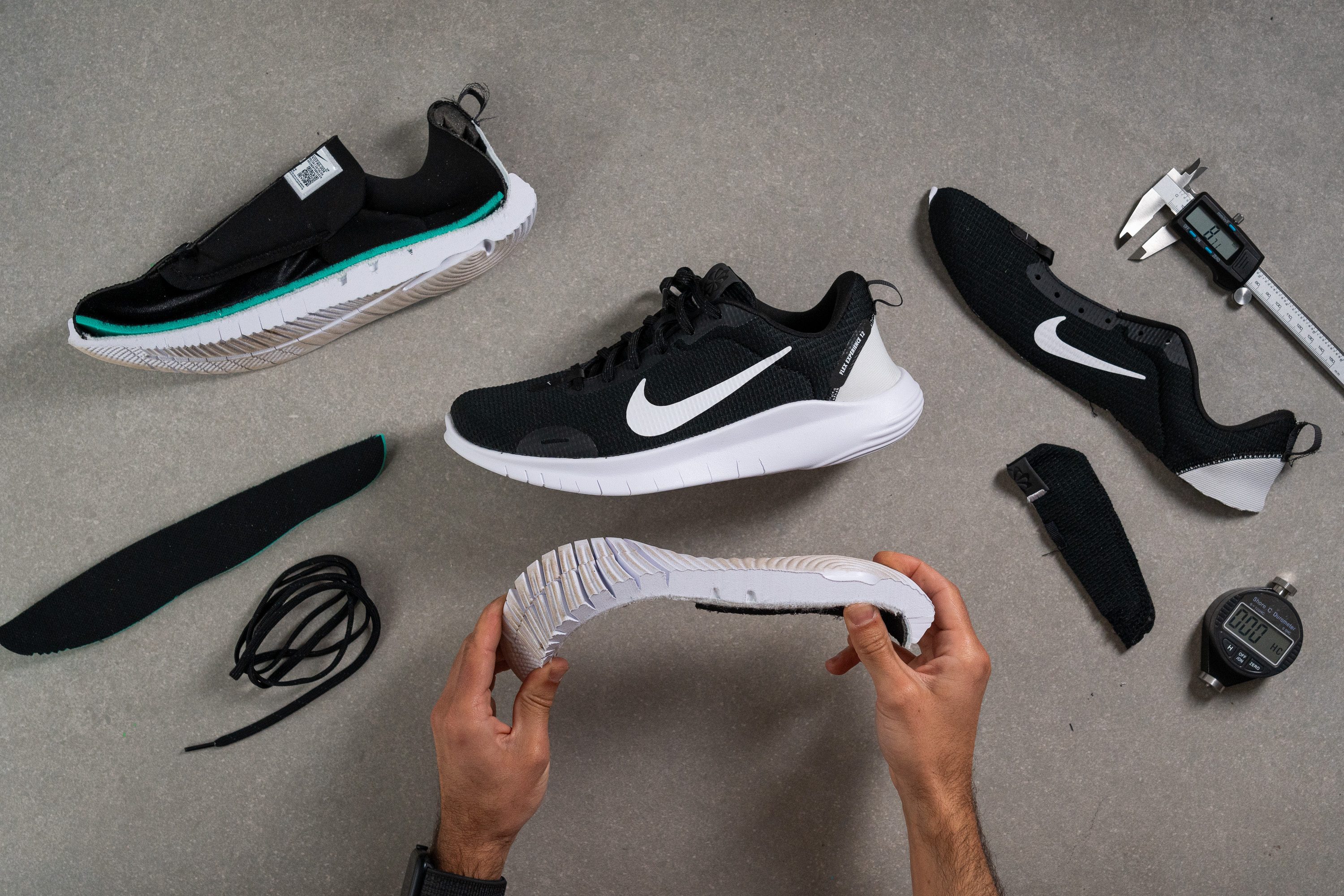
Also, we believe the Flex Experience Run 12 won't be the best choice for anyone seeking a highly cushioned ride. If you're after a budget-friendly shoe that gives you both decent cushioning and flexibility, we think the Nike Winflo 10 offers a better, softer ride.
Cushioning
Shock absorption
It’s extremely rare for a daily trainer to score under 100 SA in our shock absorption test, but the Nike Flex Experience Run 12 did just that at 98 SA... and that’s actually great news.
Why? Because this shoe is built for exactly that purpose: delivering ground feel and a highly-flexible ride.

| Flex Experience Run 12 | 98 SA |
| Average | 130 SA |
Energy return
Energy return is nothing special. In fact, it’s quite low at 51.2%, but we weren’t expecting a standout result from the basic EVA foam used in this shoe. Definitely not ideal for high-mileage runners.
| Flex Experience Run 12 | 51.2% |
| Average | 58.6% |
Heel stack
Running shoes are getting thicker every year—and even the Nike Flex series is following the trend. That's why we found a bigger stack height in the v12 (25.9 mm) than in the Flex Experience Run 11 (24.1 mm).
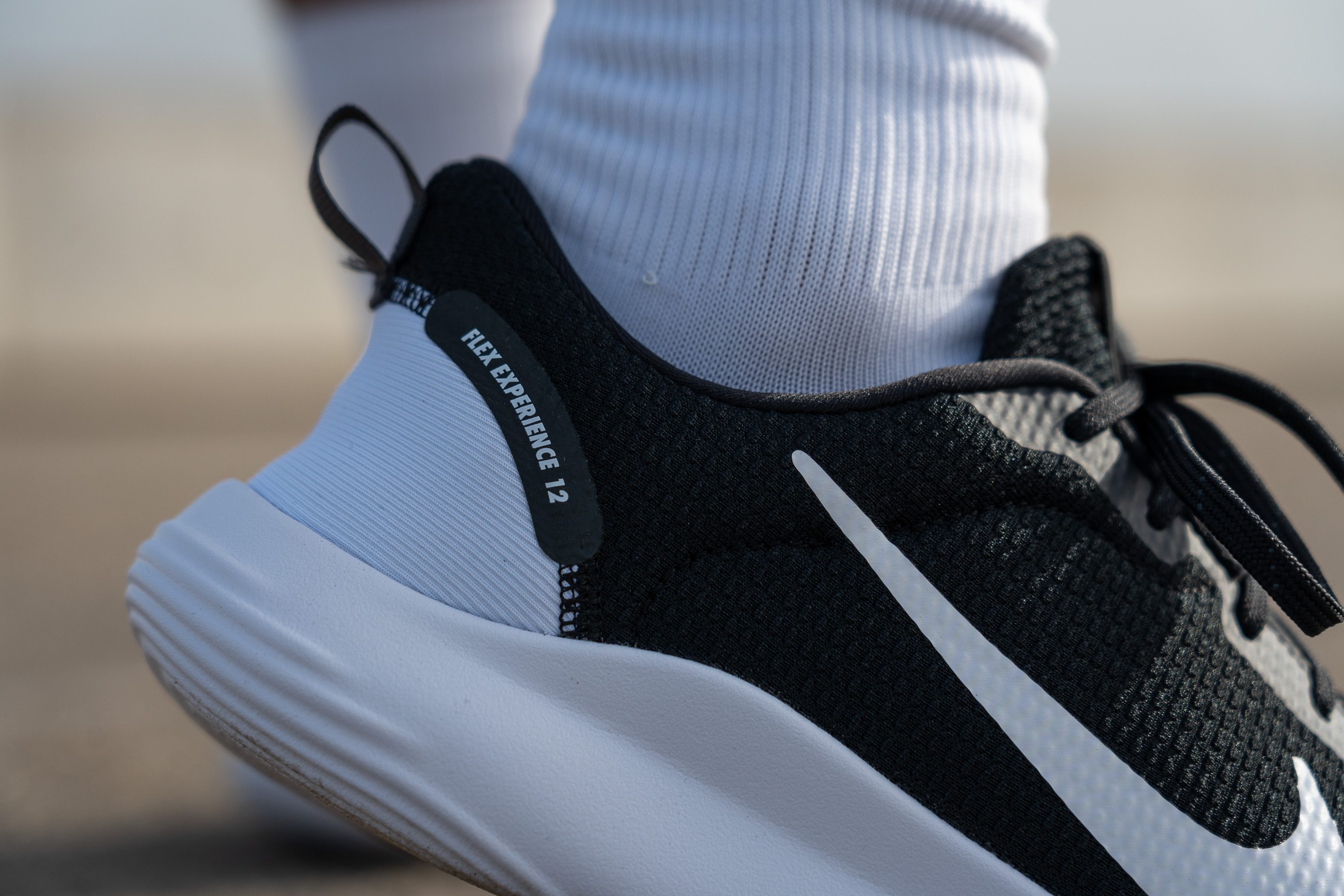
Despite the change, the experience (no pun intended) remains the same, offering a natural, grounded ride. However, it's starting to push the limits—as it approaches that 30-mm threshold, we'll need to carefully consider how much thicker is too thick for this type of shoe.
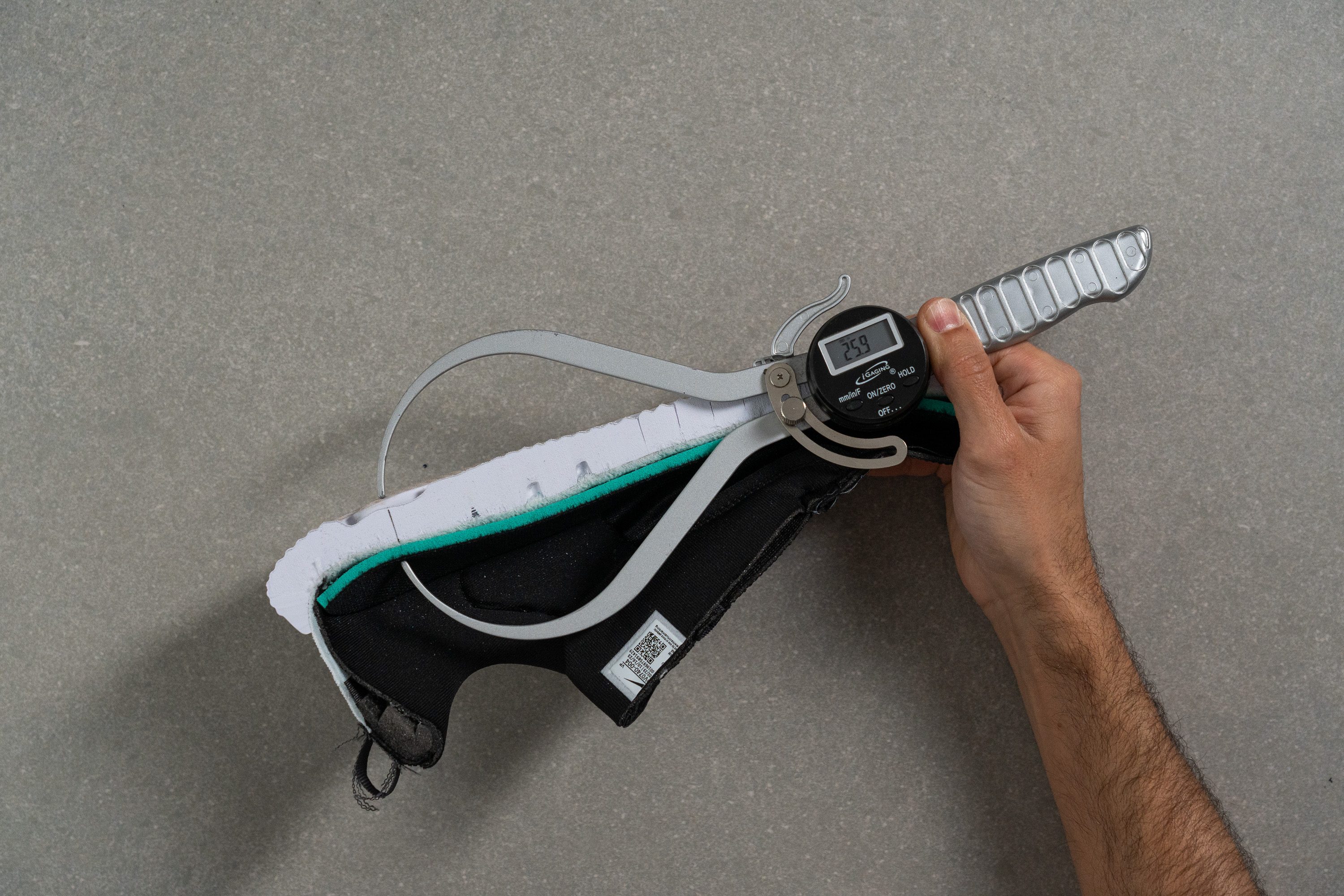
| Flex Experience Run 12 | 25.9 mm |
| Average | 34.8 mm |
Forefoot stack
The forefoot also grows 2 mm from the latest version, now measuring a full 19.9 mm.
This ensures a bit more cushioning for midfoot and forefoot strikers—a welcome change since that stack height remains comfortably low by today's standards, dipping even below the 20 mm mark.
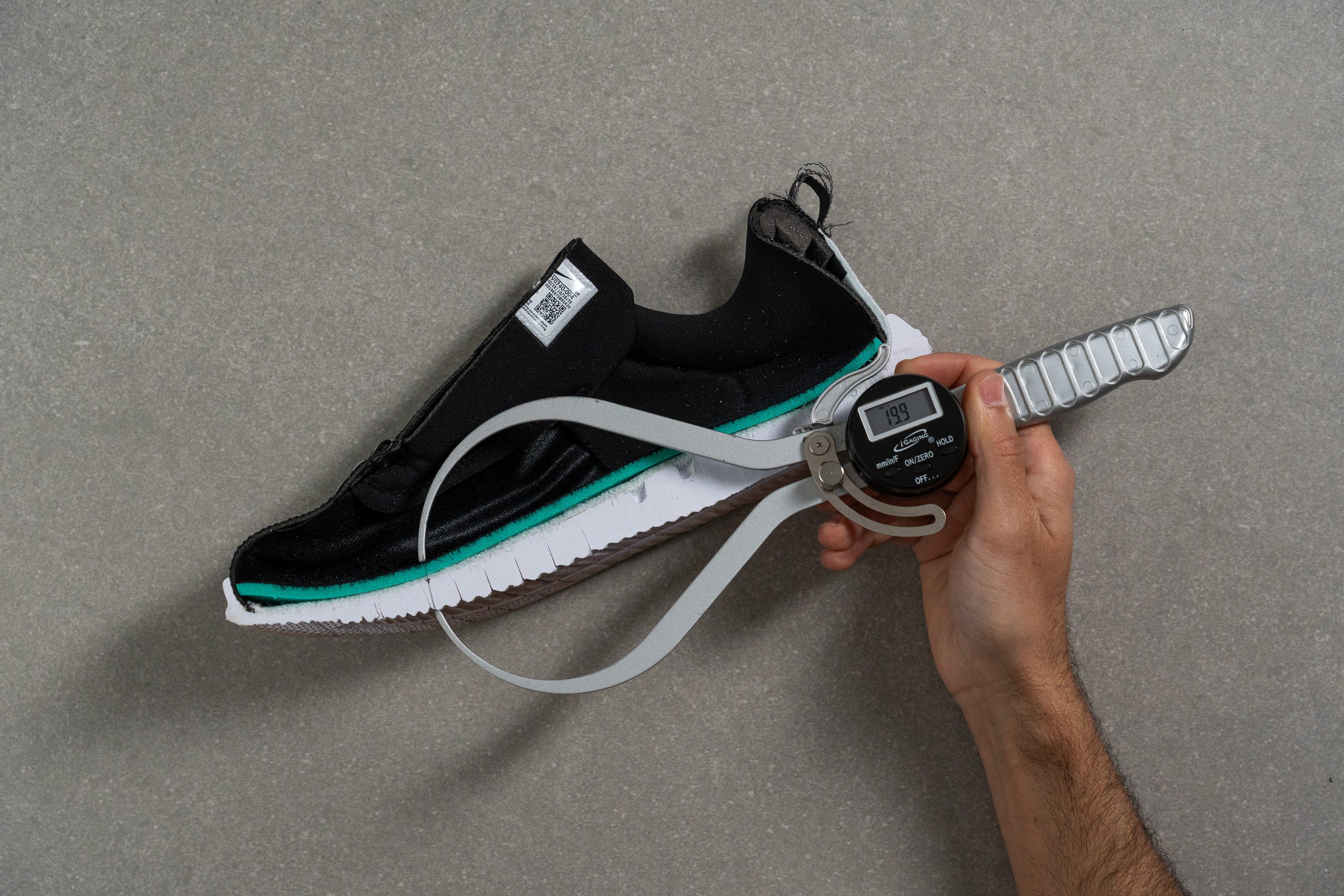
| Flex Experience Run 12 | 19.9 mm |
| Average | 26.2 mm |
Drop
These measurements reveal a balanced 6.0-mm heel-to-toe drop. We think it's the sweet spot for this shoe! It keeps that moderately-natural running feel without going full zero-drop, but isn't so steep that the shoe feels awkward even when you're just out walking.
In our opinion, this medium drop hits the mark for comfort and versatility in the Flex series.
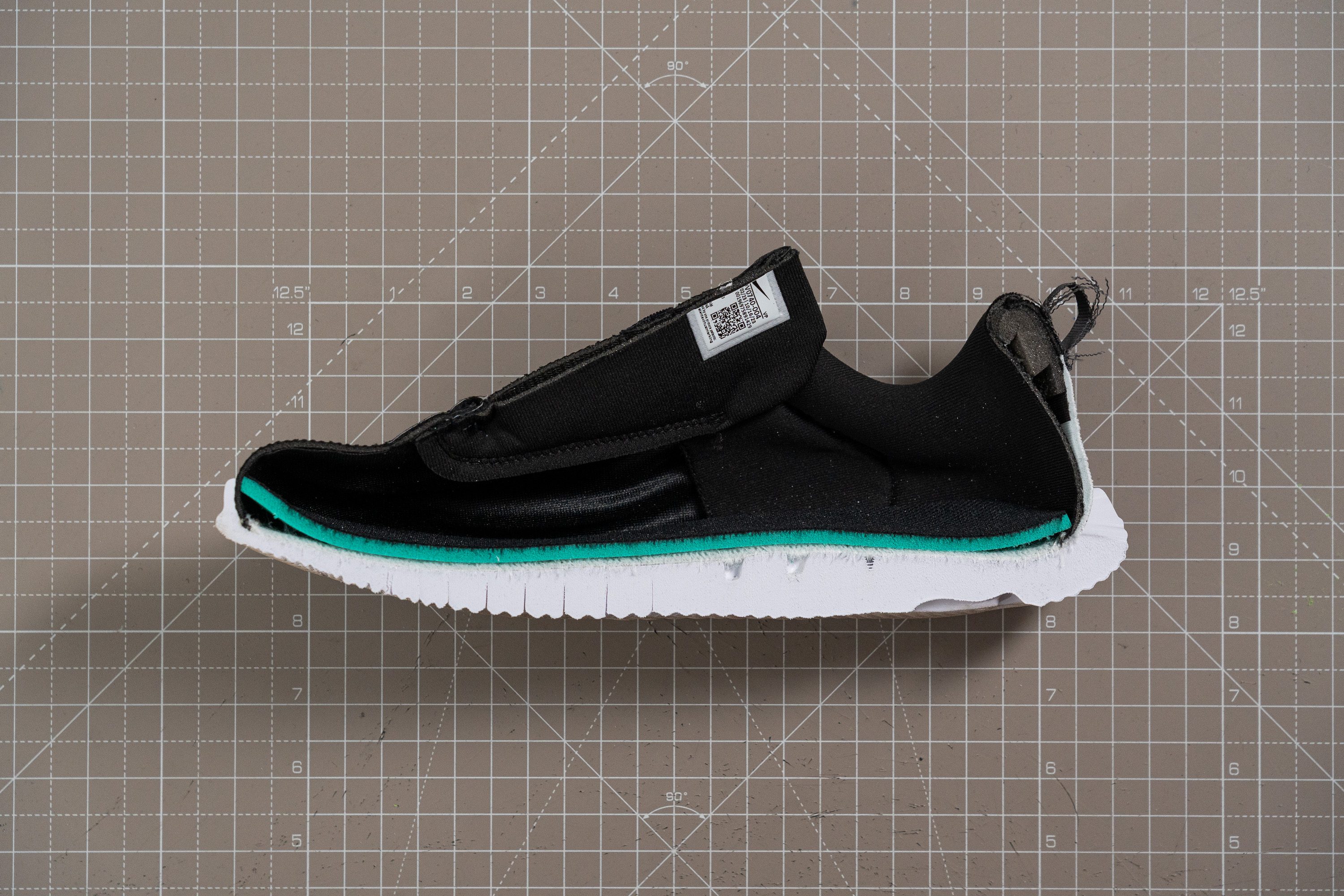
| Flex Experience Run 12 | 6.0 mm |
| Average | 8.6 mm |
Midsole softness
Now, let's dive into the midsole. The Flex Experience Run 12 sticks with a basic EVA foam—no bells or whistles here. But hey, for $75, you can't really expect fancy tech like ZoomX.
Still, we wish the midsole felt a bit softer. We got a 30.6 HA firmness rating on our Shore A durometer, meaning this shoe leans toward that firmer ride some runners love. That said, even with its low-profile design, it'll be tough to bottom out this shoe due to that firmness, and that's a plus.
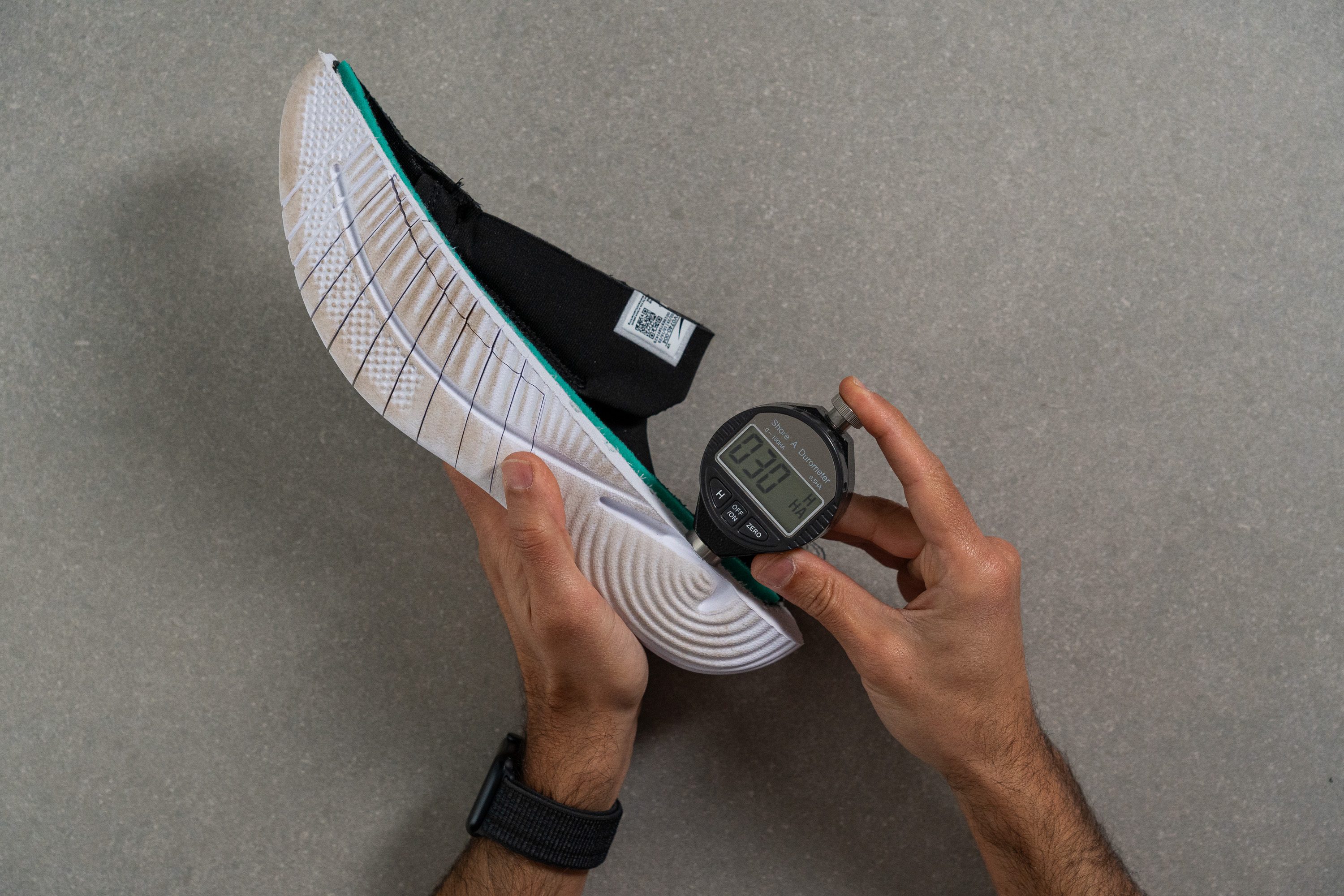
| Flex Experience Run 12 | 30.6 HA |
| Average | 20.4 HA |
Size and fit
Size
Nike Flex Experience Run 12 fits true to size (69 votes).
Internal length
| Flex Experience Run 12 | 270.0 mm |
| Average | 269.4 mm |
Width / Fit
Given the substantial midsole measurements and our comfort-driven experience during testing, we anticipated a generously spacious fit.
Instead, we discovered a width only slightly above the average, measuring 96.9 mm—sufficient for most but not ideal for wide feet.
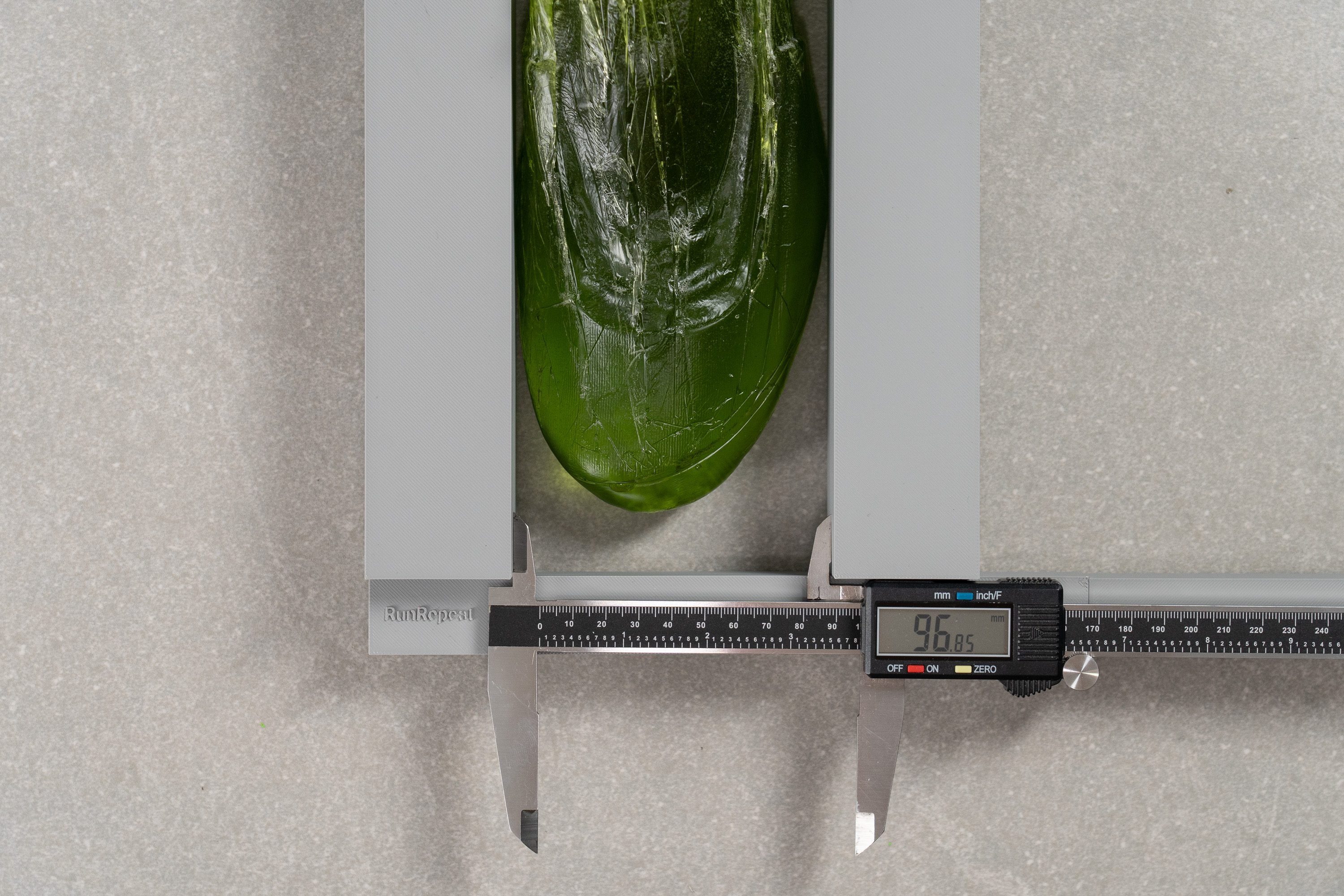
| Flex Experience Run 12 | 96.9 mm |
| Average | 95.2 mm |
Toebox width
The big toe area features a notable taper, making it a comfortable choice for those with narrower feet, but less ideal for anyone who dislikes pointy toeboxes. Measuring 71.8 mm, it offers minimal room for toe splay.
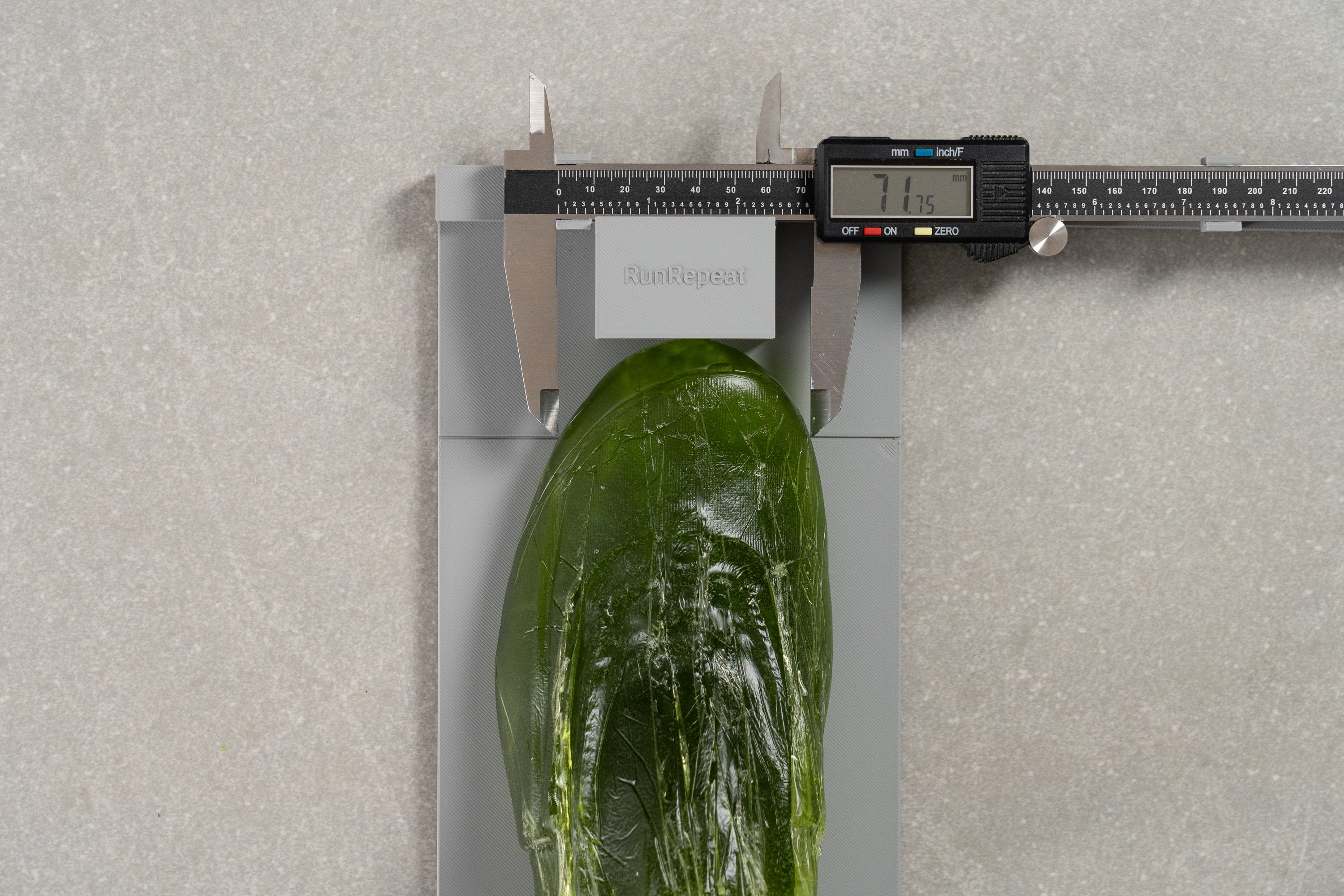
| Flex Experience Run 12 | 71.8 mm |
| Average | 73.3 mm |
Toebox height
On the flip side, Nike delivered a generous 28.8 mm of height in the toe area—an excellent result for runners who prioritize comfort and appreciate ample vertical space in their shoes.
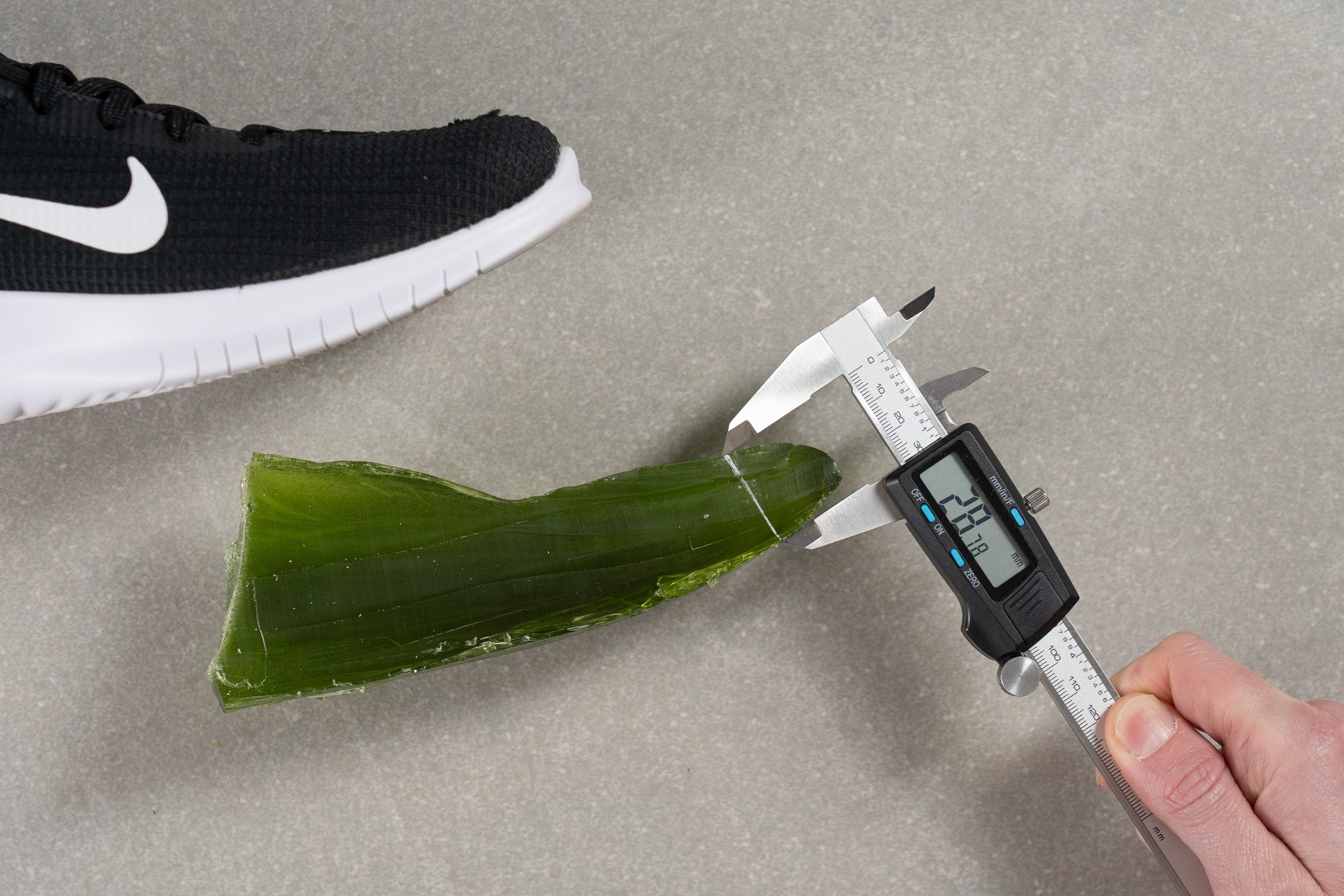
| Flex Experience Run 12 | 28.8 mm |
| Average | 27.1 mm |
Traction / Grip
Traction test
We tested the Nike Flex Experience Run 12 with the SATRA TM144 method and recorded a score of 0.36. Not a surprise, since shoes with exposed midsoles like this one usually struggle for confident grip when it gets slippery.
On dry ground, the traction is good for average mileage and everyday comfort-focused runs. Still, if you often face rainy or unpredictable conditions, the Flex Experience Run 12 may not be the best weapon.
| Flex Experience Run 12 | 0.36 |
| Average | 0.49 |
Outsole design
Forget that classic rubber outsole, this one uses treated EVA foam instead. In other words, the same foamy midsole material, but toughened up a bit. The outsole also features numerous cutouts to enhance flexibility.
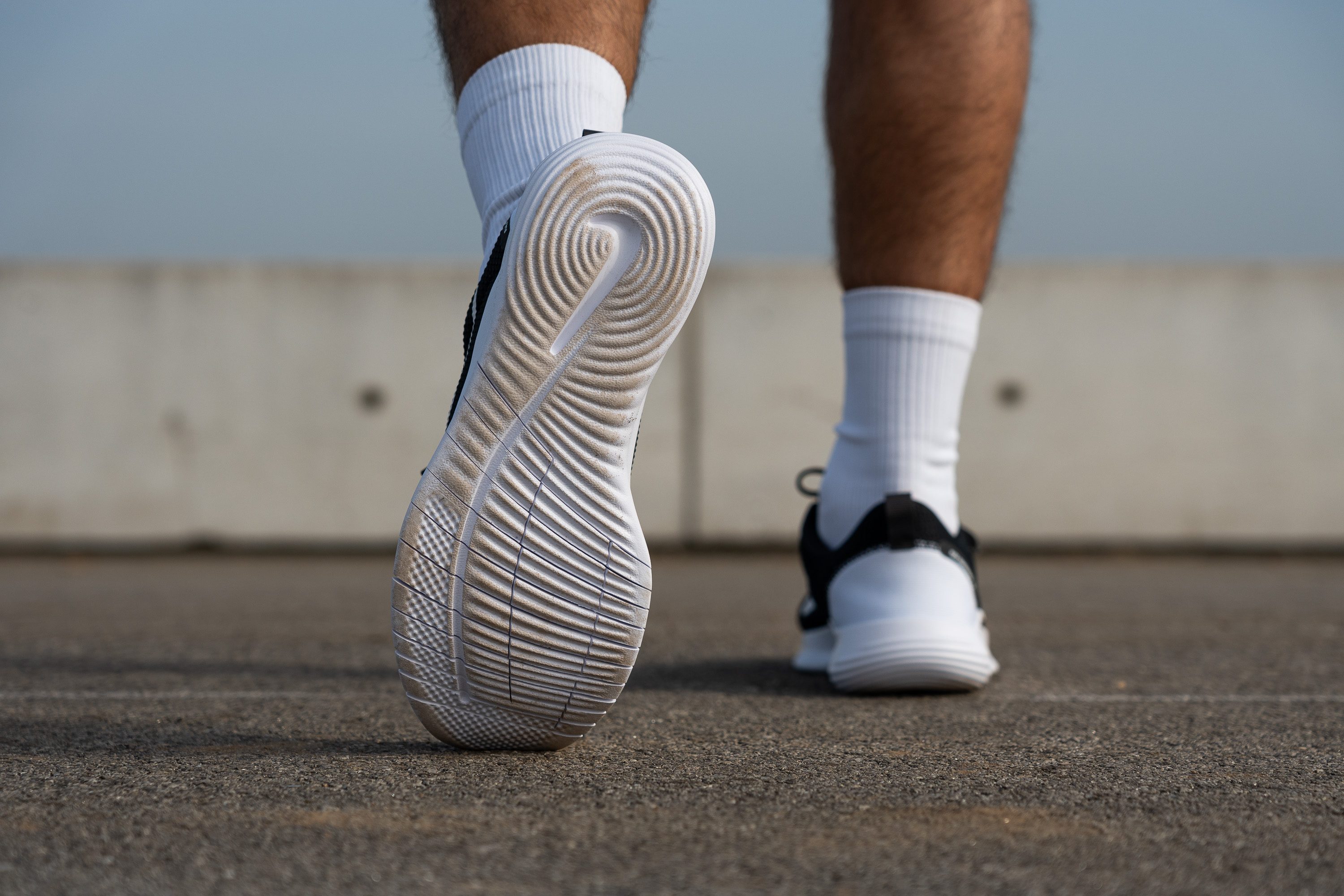
Flexibility / Stiffness
Using a force gauge, we measure how much pressure it takes to bend the shoe to an exact 30-degree angle. We only needed 4.6N!
This is one of the most bendy shoes we've ever tested. Seems clear to us that the Flex Experience Run 12 is the Simone Biles of running shoes.
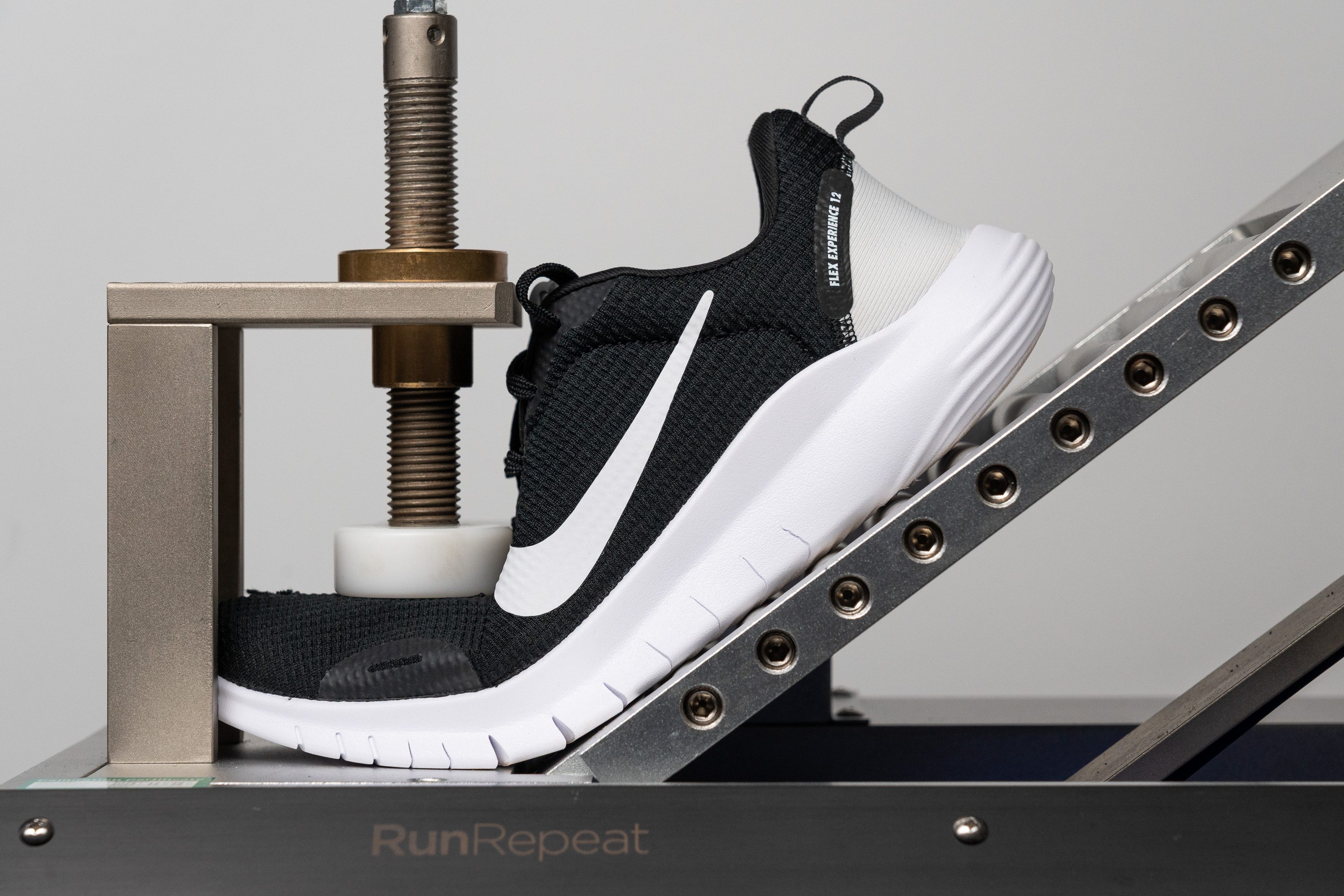
| Flex Experience Run 12 | 4.6N |
| Average | 15.4N |
Weight
A major perk of ditching a traditional outsole and going for that sleek, low-profile design is a lightweight build.
But even with that in mind, the Flex Experience Run 12 could stand to lose some ounces—8.5 oz (241g) feels a bit hefty for such a thin misole!
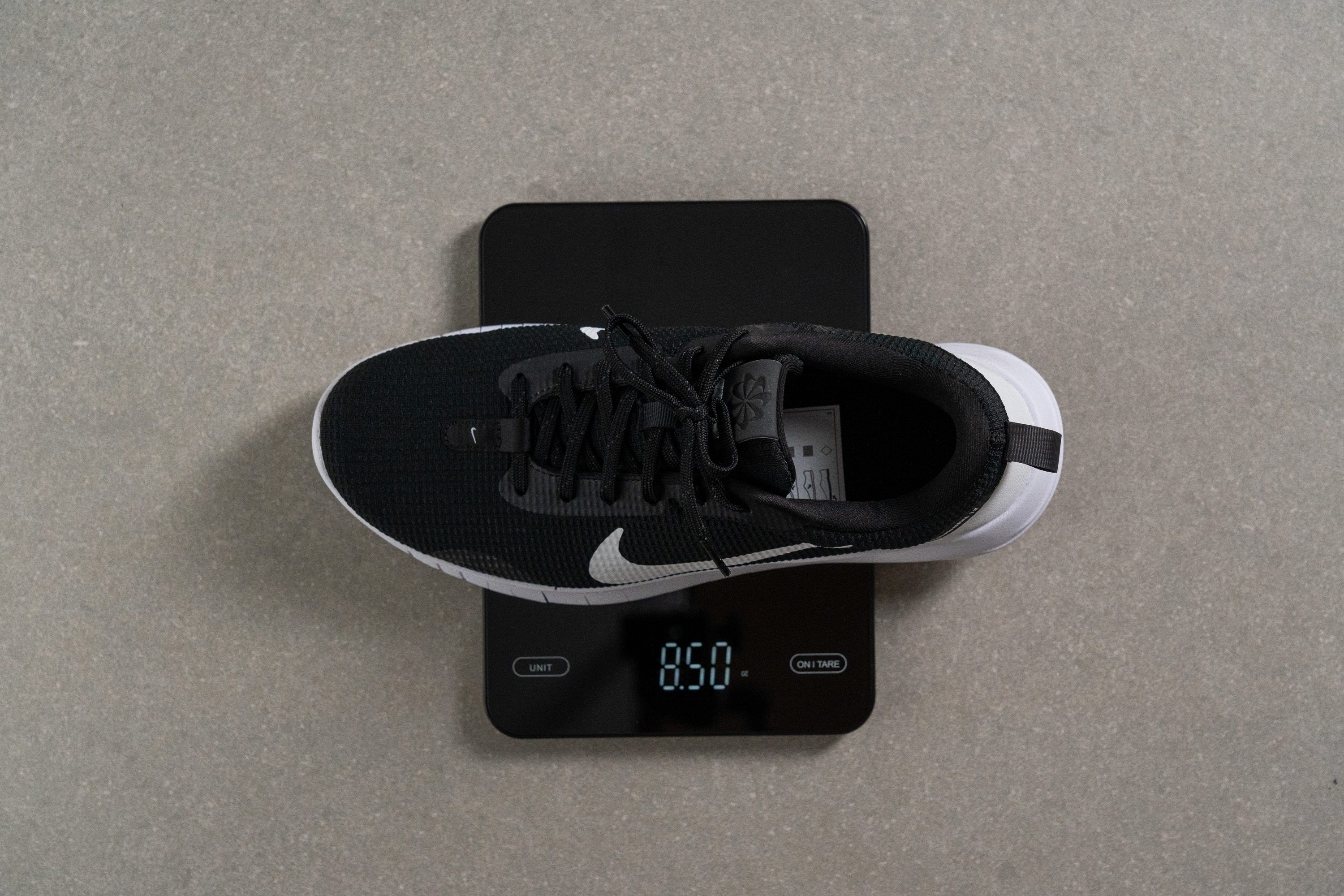
| Flex Experience Run 12 | 8.5 oz (241g) |
| Average | 9.3 oz (264g) |
Breathability
Right off the bat, the mesh on the Nike Flex Experience Run 12 looked super thick, and we were worried it'd feel like a sauna on our feet.
After our lab tests, those fears were mostly confirmed—this shoe just doesn't breathe that well. We gave it a 3/5, which means it's passable on milder days but don't even think about these for those sweltering summer runs, especially if you get this black colorway.
A quick trick that we use to judge breathability is the light test—holding the shoe up against a light. In this case, the Run 12's thick mesh pretty much blocked everything, confirming what we felt just by using them.

Diving deeper with our microscope, we saw a thick engineered mesh with no room for air to pass through. It would be awesome to see Nike add some ventilation holes, but at a $75 price point, we understand why they went with this less airy design.
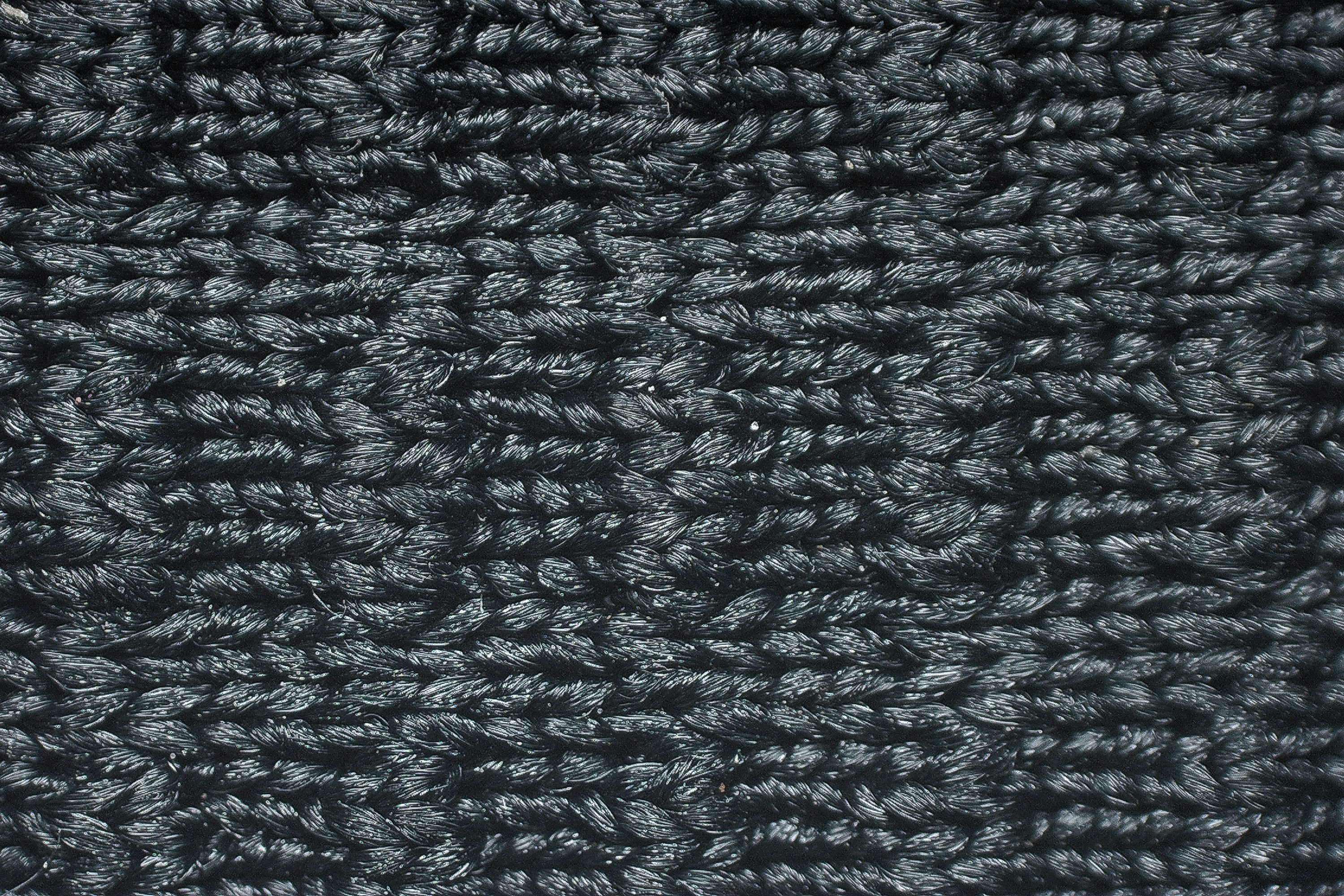
Don't expect luxurious comfort here like in a $150 shoe. But for $75, it really does the job!
| Flex Experience Run 12 | 3 |
| Average | 3.7 |
Stability
Lateral stability test
One major bonus of that firm, rock-solid ride? Incredible stability—this Nike absolutely delivers in that department!
Even better, we discovered some cleverly designed midsole sidewalls that hug the sides of your foot, helping to guide your stride forward rather than letting it roll laterally. Extra features like this one are a delightful surprise you usually only find in much pricier running shoes...
Torsional rigidity
Every Nike Flex shoe lives up to its name, being designed to be super flexible. Multiple cutouts in the outsole allow for plenty of bend and twist, which is exactly why this shoe earned a perfect 1/5 score.
That ultra-flexible feeling is exactly what we were looking for!
| Flex Experience Run 12 | 1 |
| Average | 3.5 |
Heel counter stiffness
Of course, the upper follows the same flexible, comfy philosophy. The heel counter practically folds on itself with even light pressure—another clear-cut 1/5 score for us.
| Flex Experience Run 12 | 1 |
| Average | 2.9 |
Midsole width - forefoot
Now let's shift our focus to the midsole—and wow, this forefoot boasts some surprising width!
Our digital caliper clocked it at a whopping 117.6 mm. This generous width adds to the stable feel we loved on the run, and opens up the possibility for a delightfully roomy toebox as well.
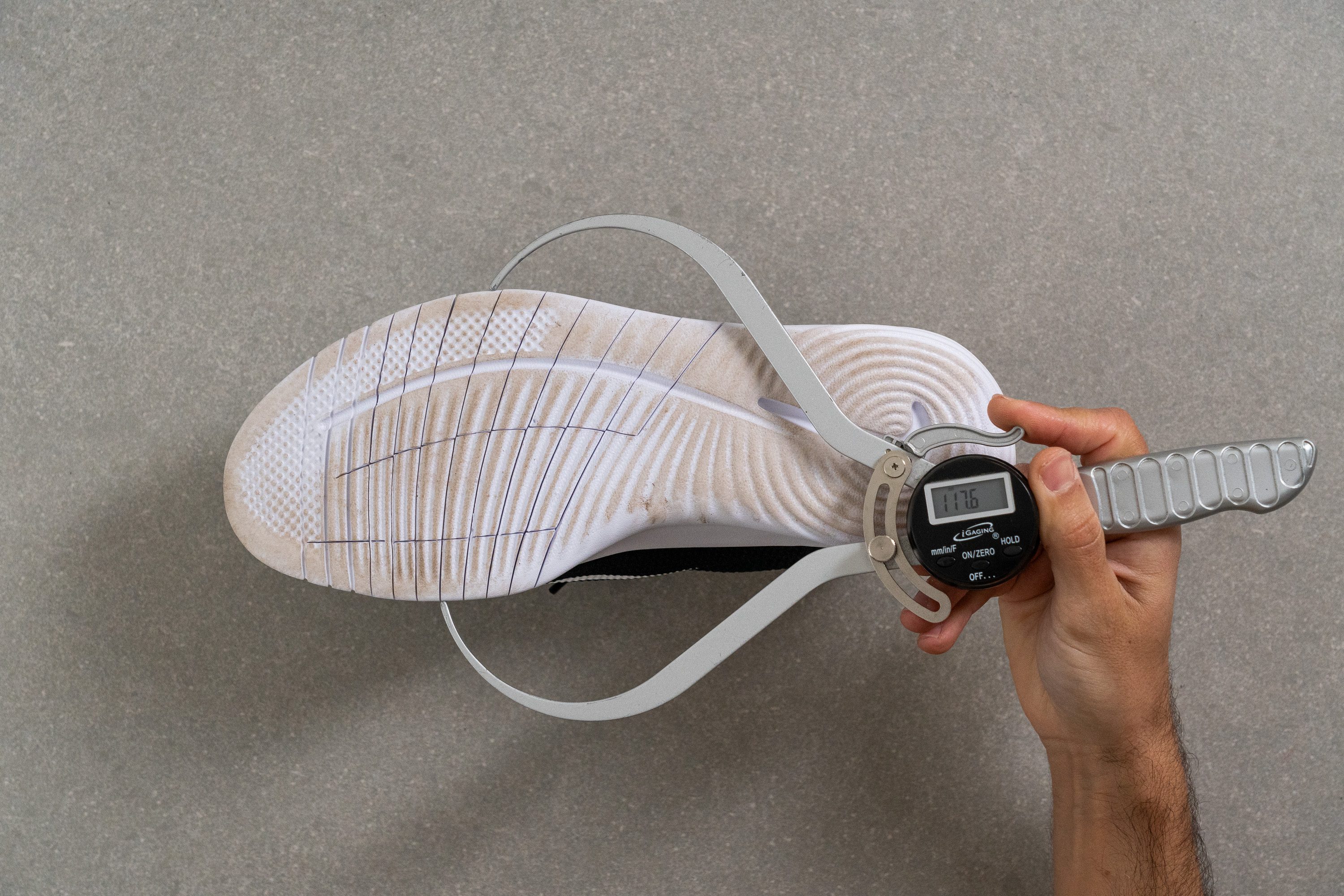
| Flex Experience Run 12 | 117.6 mm |
| Average | 114.4 mm |
Midsole width - heel
We measured the heel at 88.6 mm. This falls right around average, with maybe a slight lean toward narrow, nothing worrisome though.
With that 6-mm drop and the wider forefoot/slightly narrower heel design, the Flex Experience Run 12 definitely favors those with a midfoot or more natural running strike.
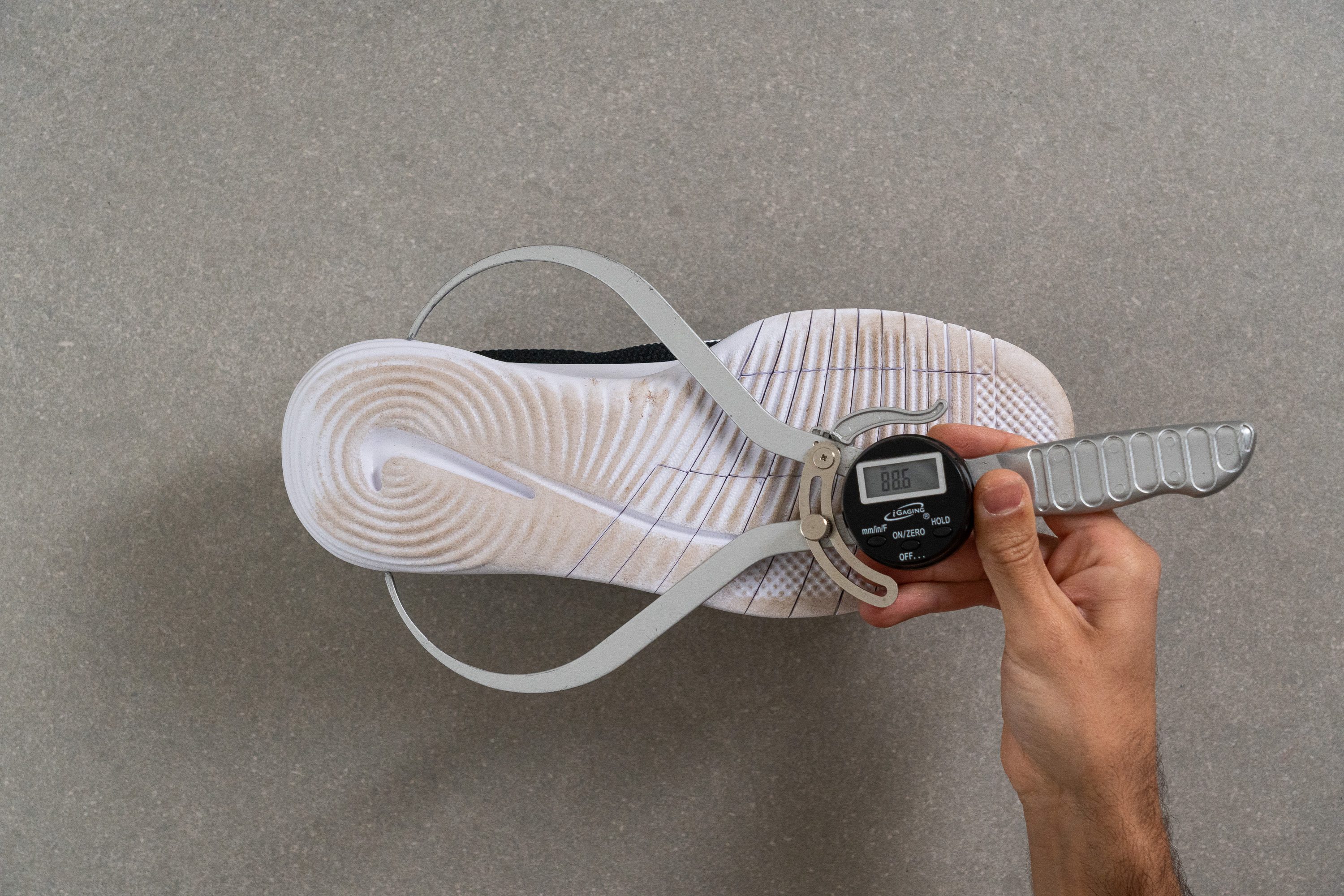
| Flex Experience Run 12 | 88.6 mm |
| Average | 90.6 mm |
Durability
Toebox durability
The trade-off with a less-ventilated upper? Well, you often get a boost in durability! Fewer ventilation holes in the mesh means fewer potential breaking points.
We believe that's the main reason this shoe earned a better-than-average 3/5 in our durability test.
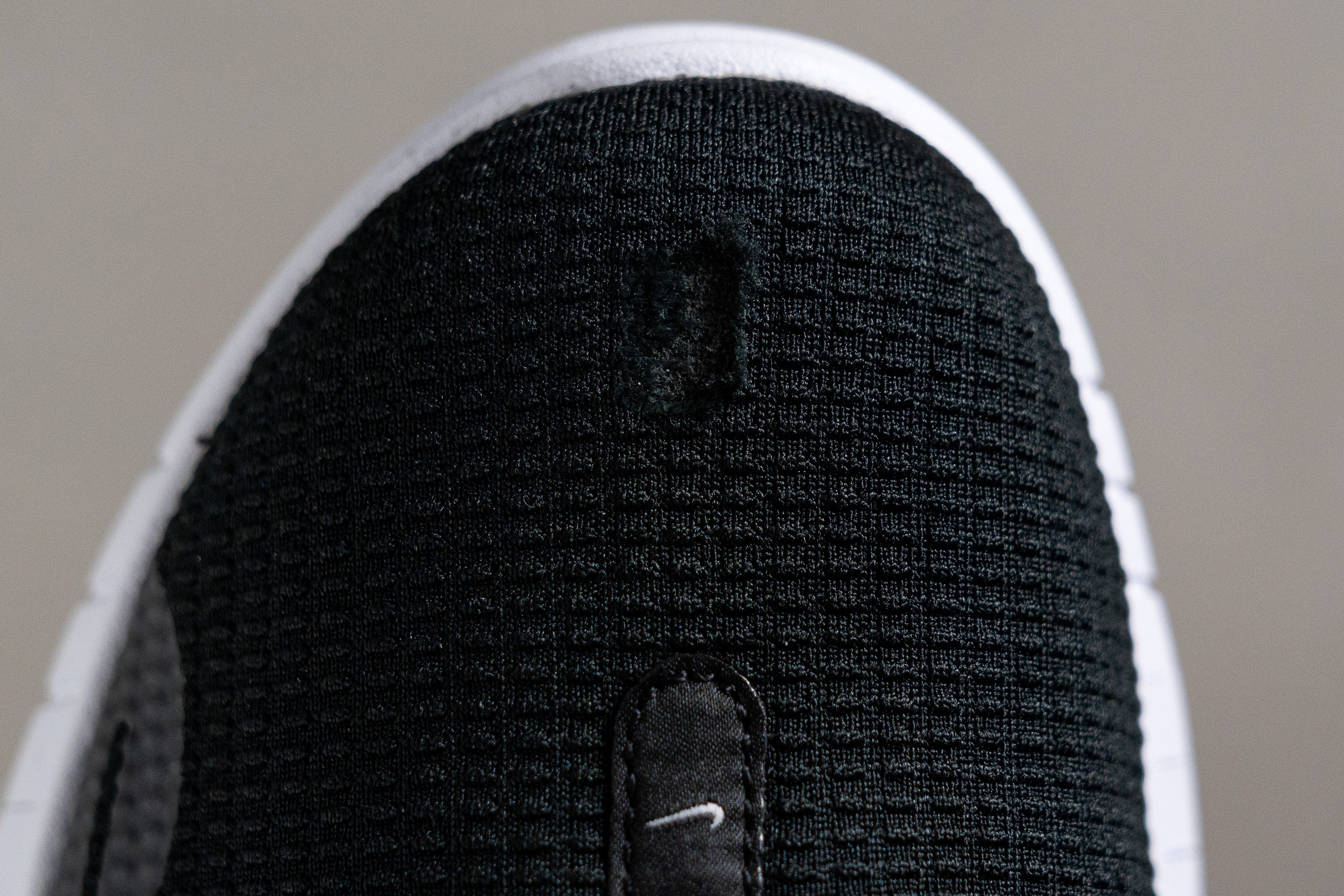
| Flex Experience Run 12 | 3 |
| Average | 2.6 |
Heel padding durability
Our Dremel test in the heel revealed that the heel padding was even more durable than the toebox!
After putting it through the wringer, we were amazed to find almost zero damage—this impressive level of toughness earned it a perfect 5/5 score for the v12!
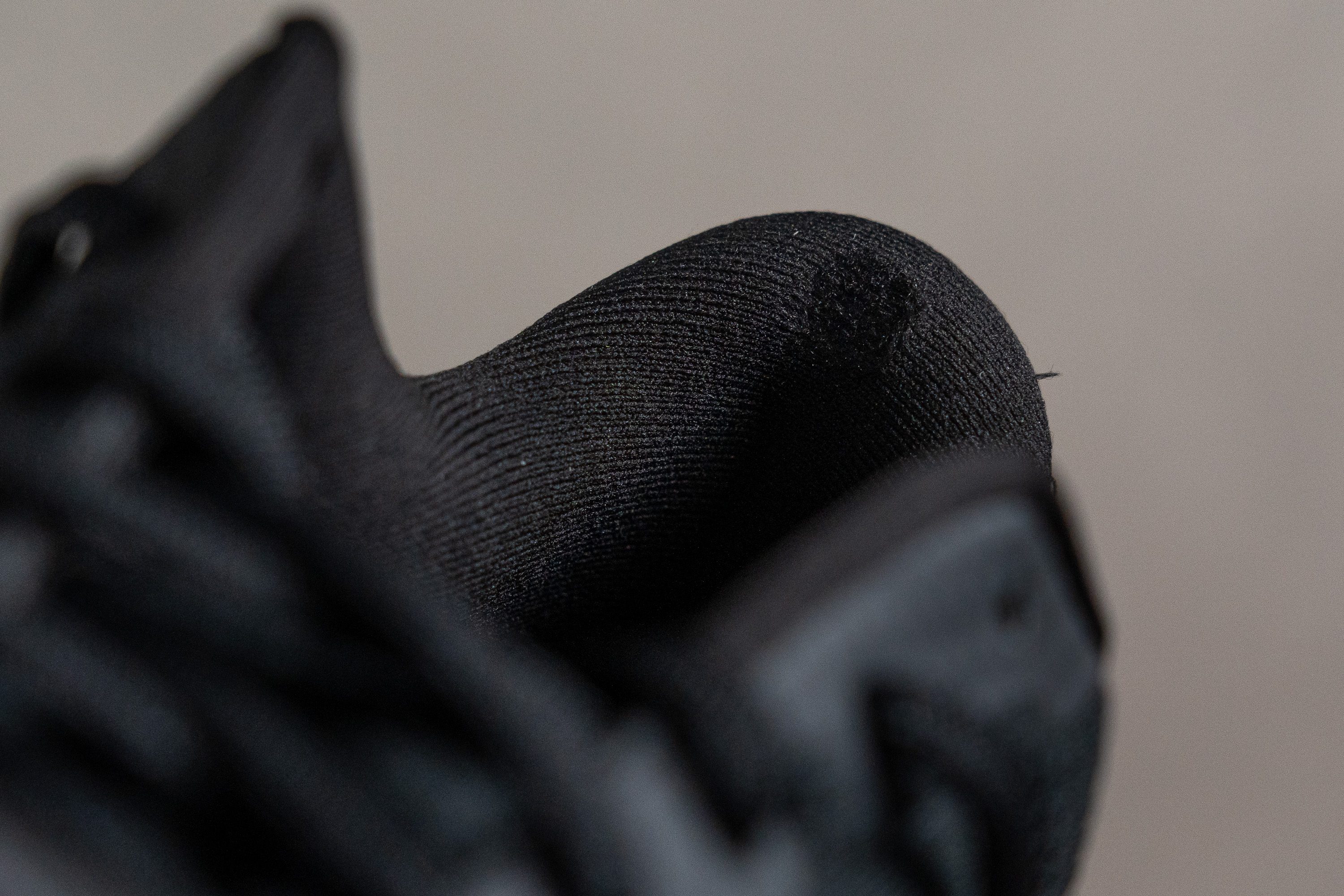
| Flex Experience Run 12 | 5 |
| Average | 3.4 |
Outsole durability
Well... this didn't go well, but honestly, we weren't surprised. The material underfoot just isn't that tough. The Dremel tore through it effortlessly, leaving a pile of white midsole debris in its wake. The damage was brutal, a teeth-grinding 5.0-mm indentation.
Of course, the Dremel test is geared toward those tough rubber outsoles that +99% of running shoes have, so the results are a bit biased here. Regardless, one thing's for sure—this shoe won't last long if you go off-roading, and even pavement might wear it down pretty quickly.
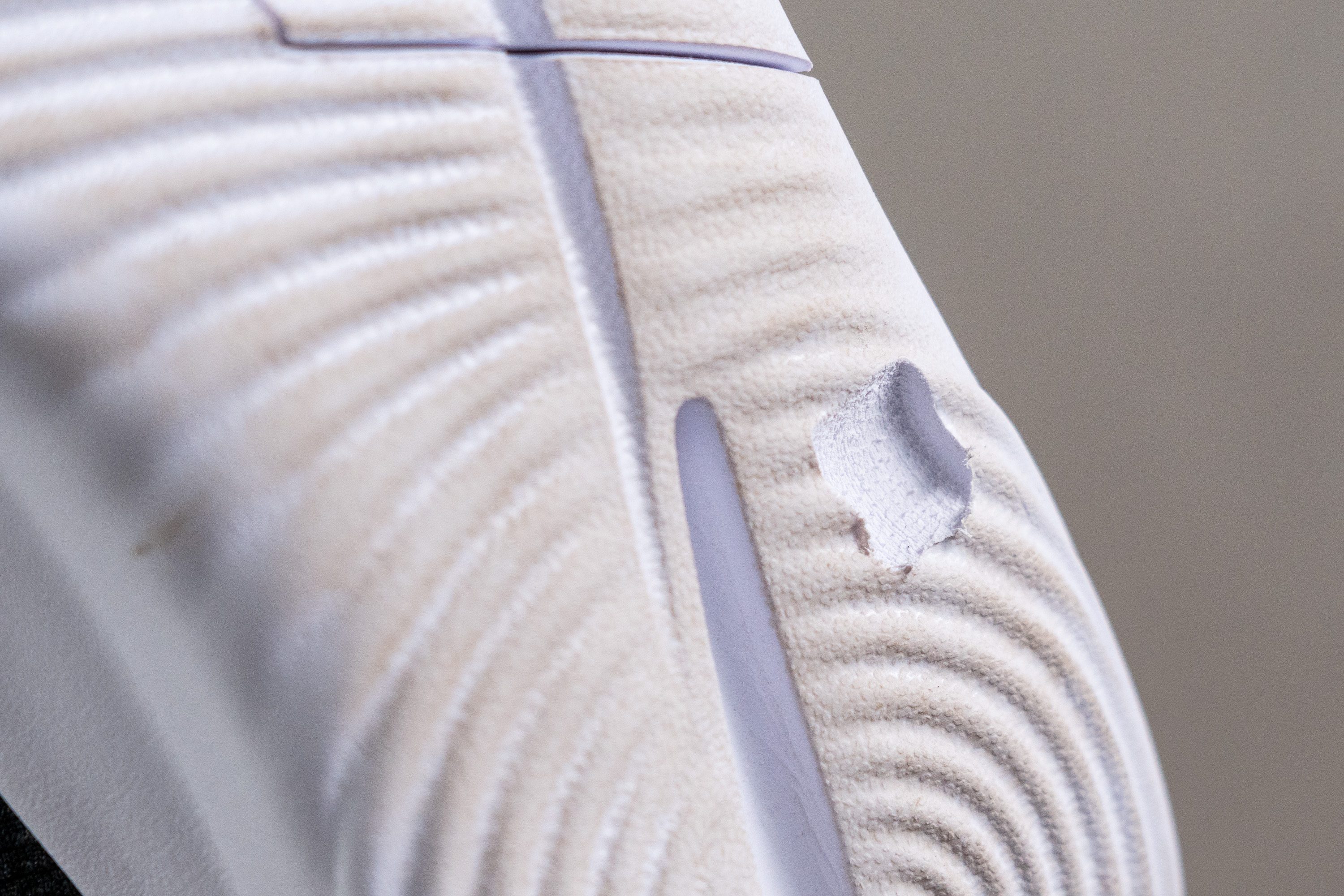
| Flex Experience Run 12 | 5.0 mm |
| Average | 1.1 mm |
Misc
Insole thickness
The insole is right around average thickness at 4.4 mm, so it should feel similar to what you're used to in most running shoes. Plus, the soft material adds a touch of extra comfort both walking and running.
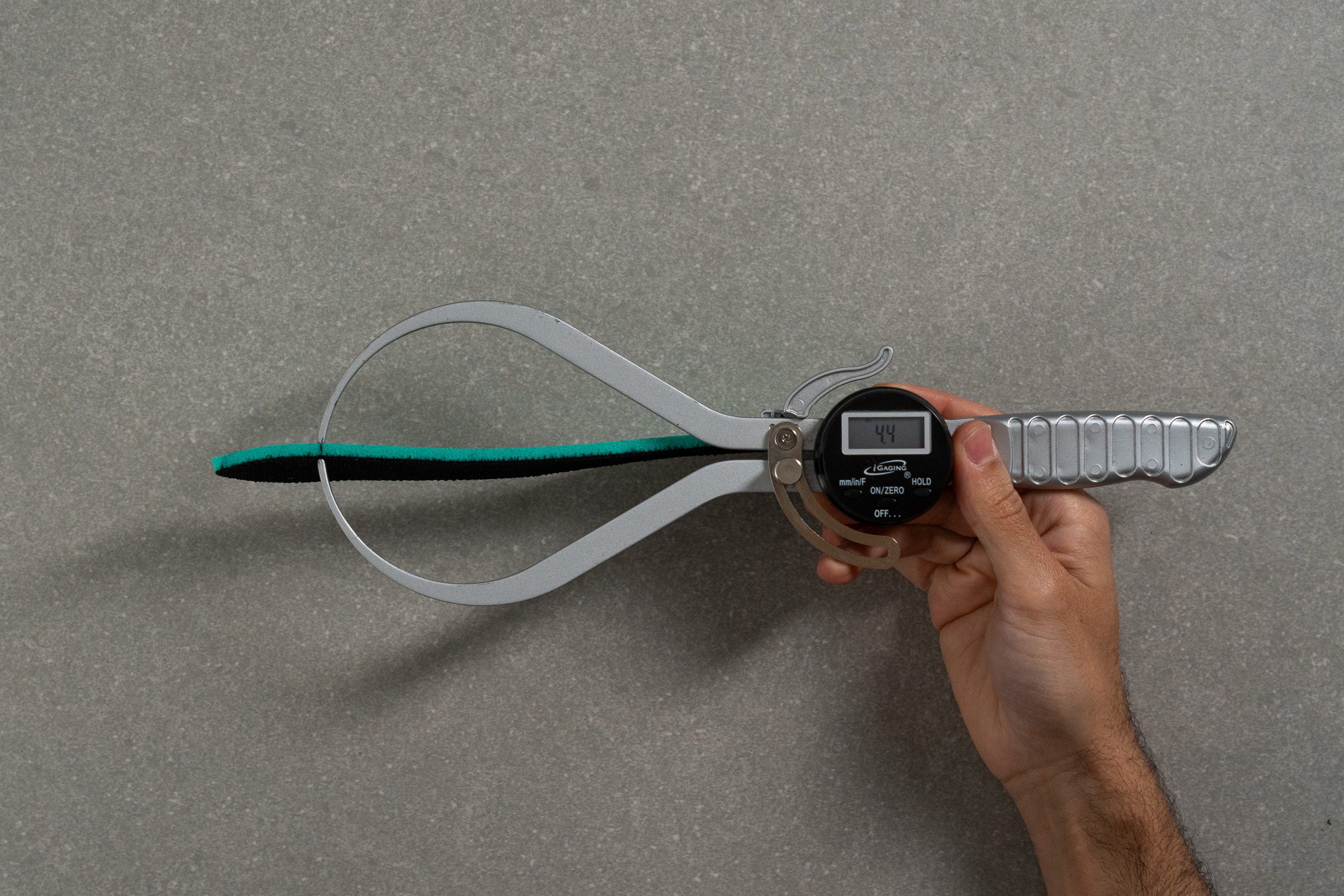
| Flex Experience Run 12 | 4.4 mm |
| Average | 4.5 mm |
Removable insole
Good news, the insole is removable, so if you prefer a different one, it's easy to swap thanks to the shoe's standard dimensions.
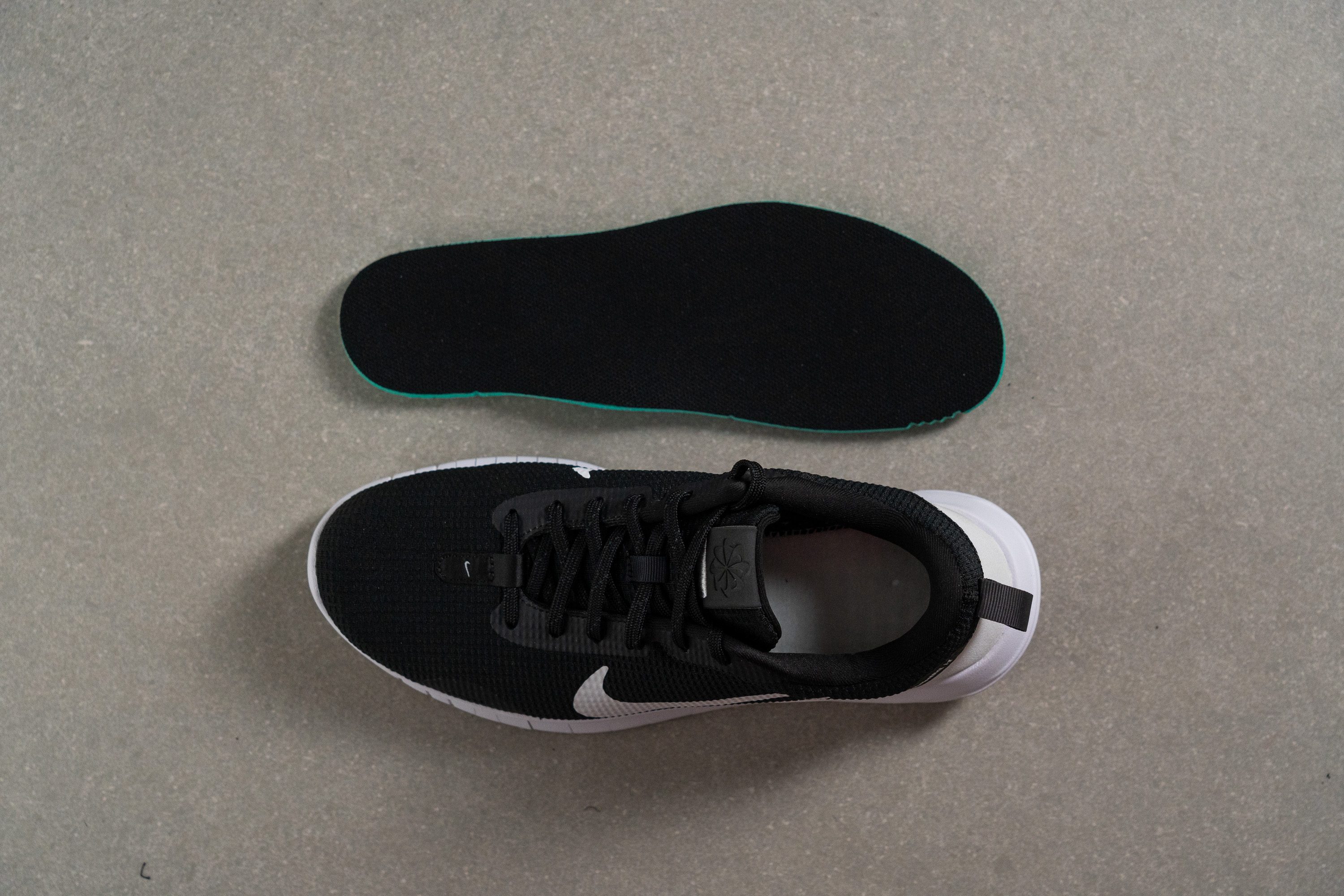
| Flex Experience Run 12 | Yes |
Midsole softness in cold (%)
While its less-than-airy upper might not be ideal for summer, this shoe is a surprisingly solid pick for winter walks and runs! Even better, our lab tests revealed that the EVA foam gets just 13.1% firmer in chilly temperatures—an awesome result considering EVA usually stiffens up significantly in the cold.
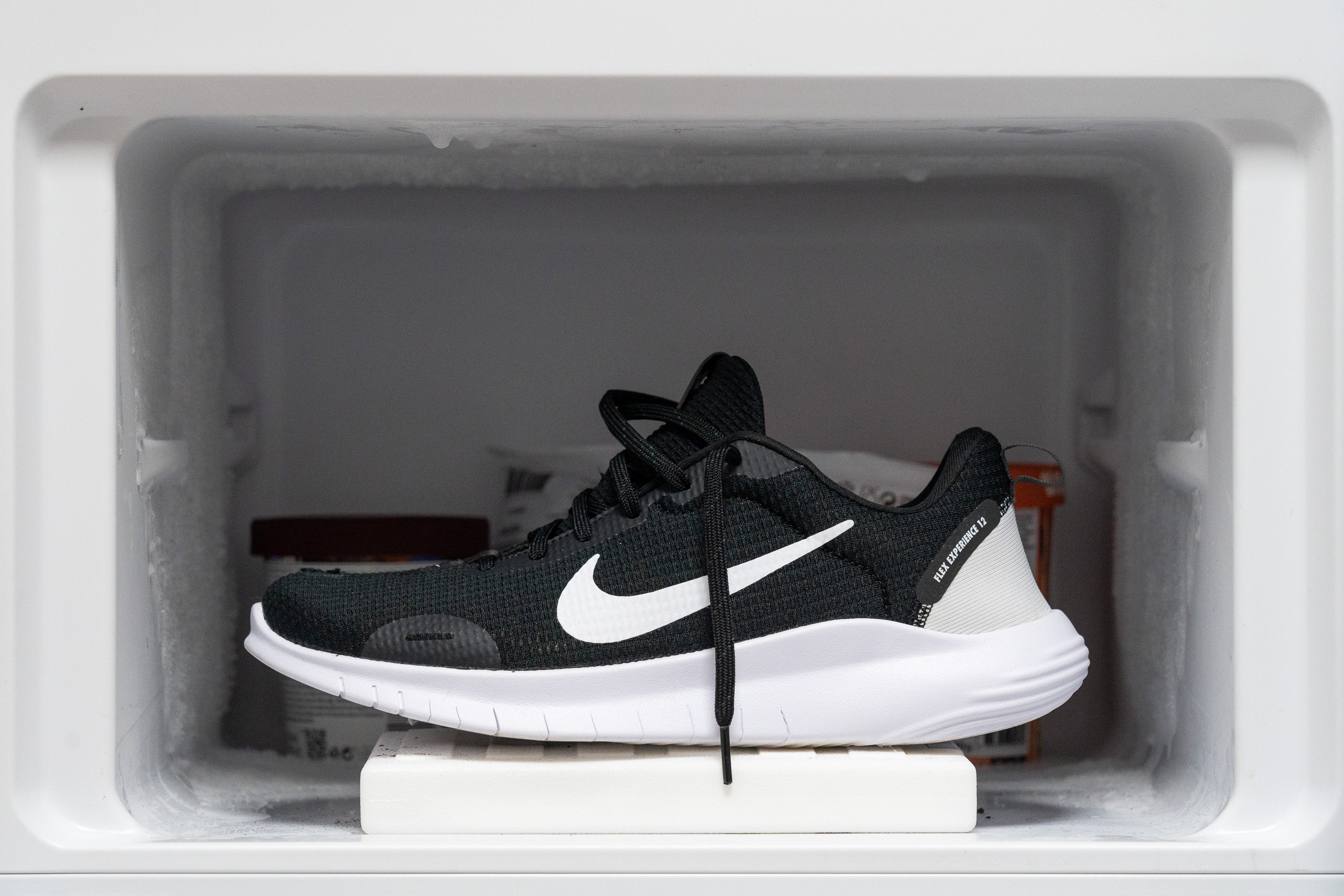
| Flex Experience Run 12 | 13% |
| Average | 24% |
Reflective elements
Sadly, there's not a single reflective element to be found on the Flex Experience Run 12. However, considering its affordable price tag, we can't really fault it for skipping on premium features.
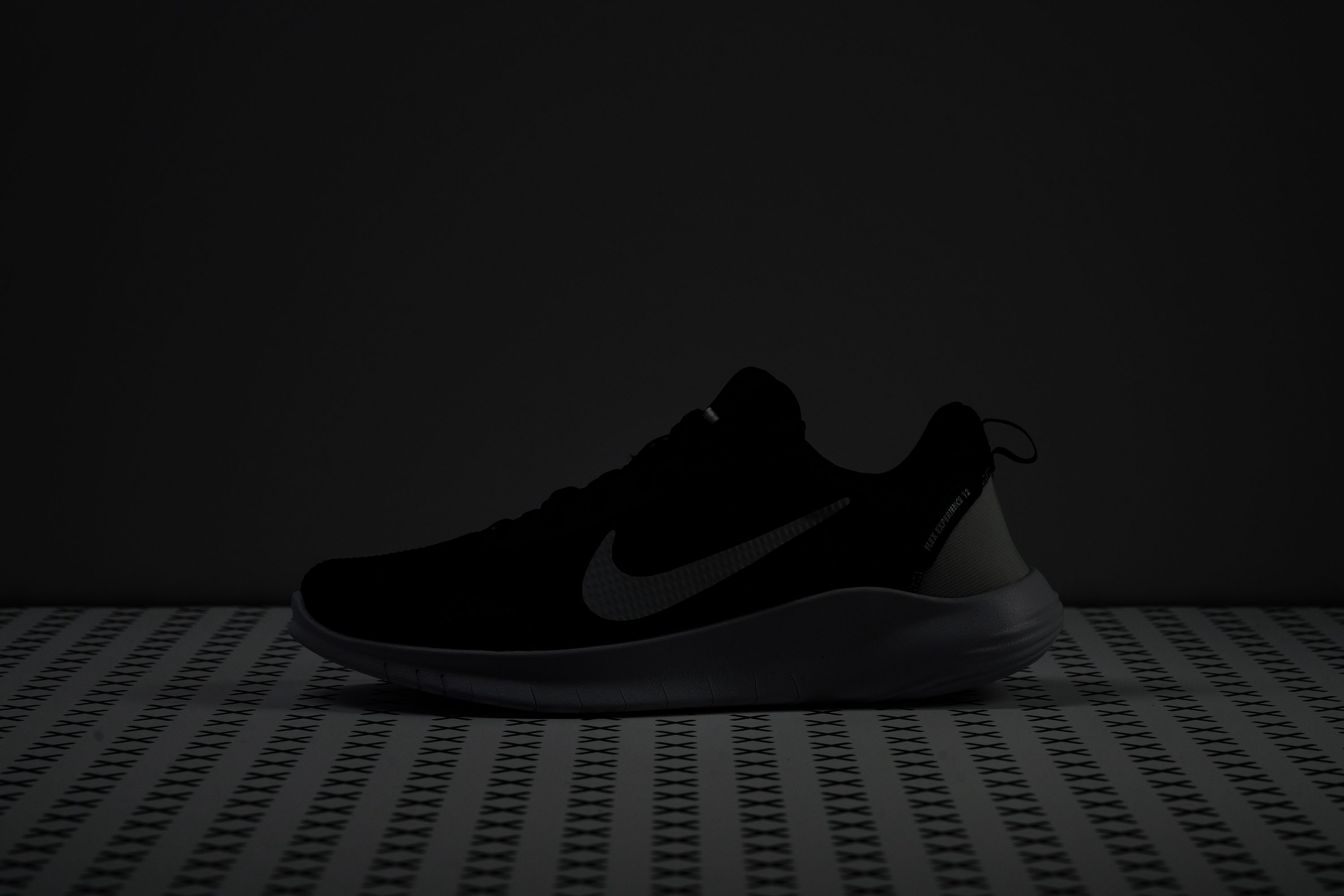
| Flex Experience Run 12 | No |
Tongue padding
Our next stop was checking out the tongue padding.
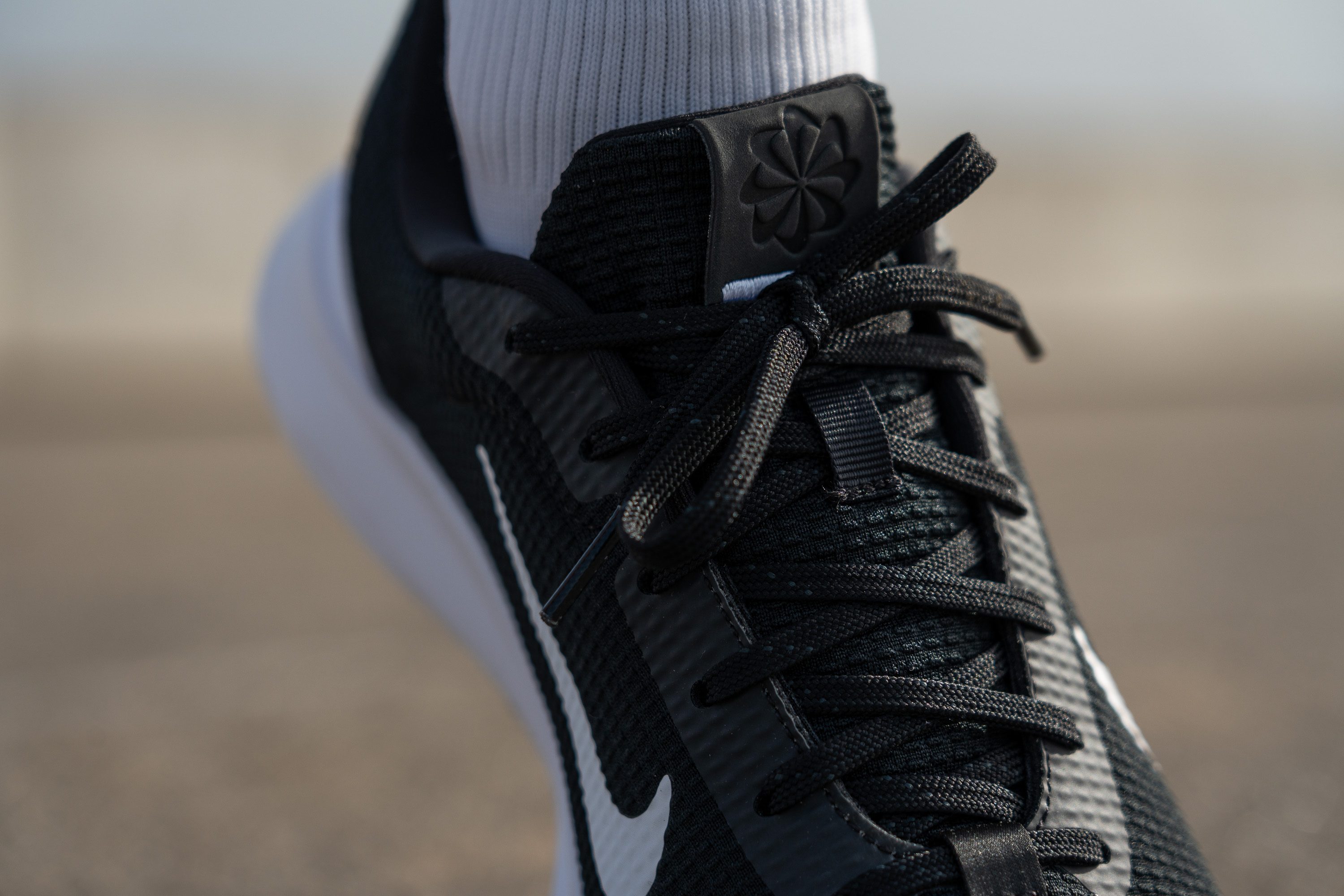
It measures a respectable 4.0 mm, offering some cushioning without adding unnecessary bulk to the shoe.
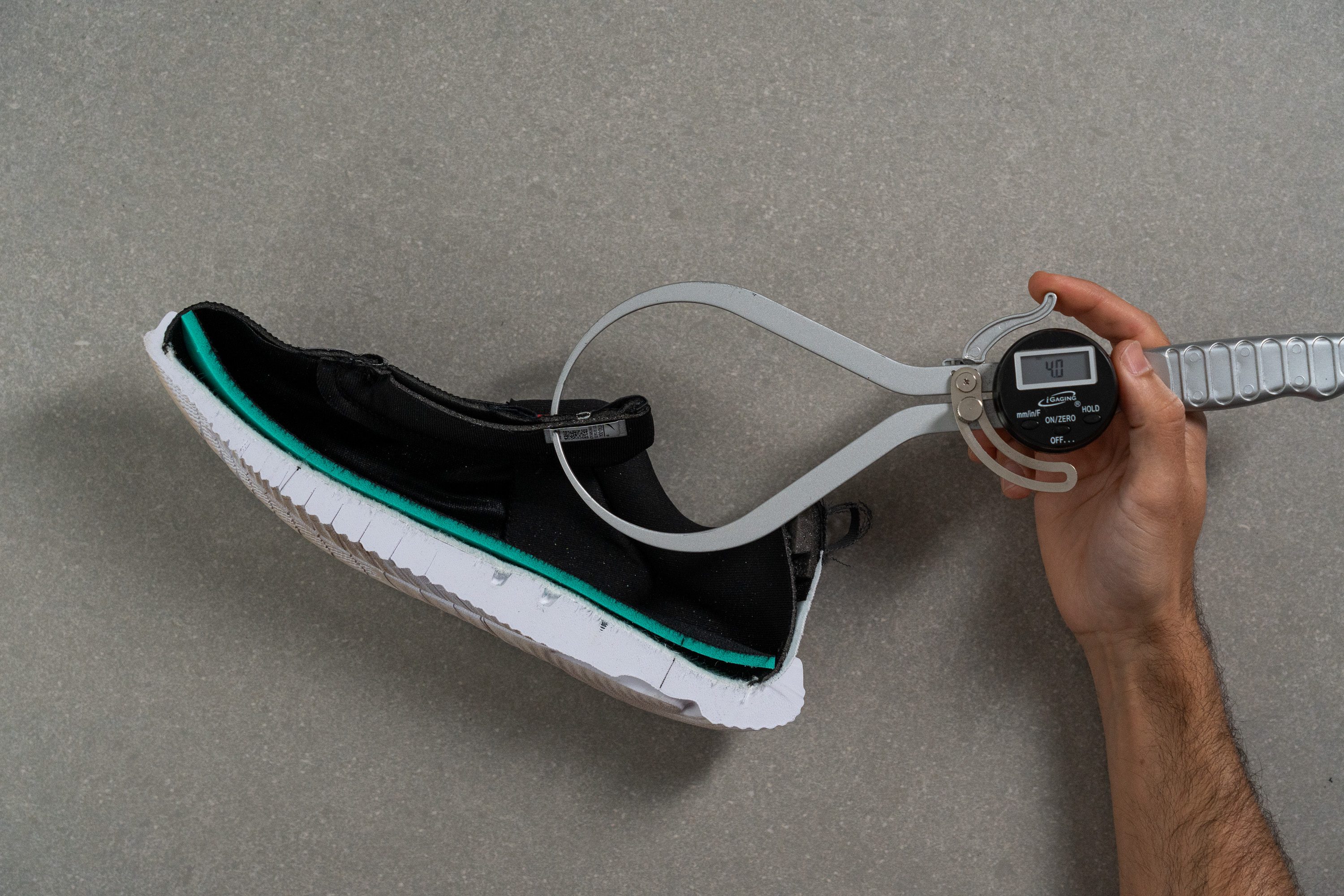
| Flex Experience Run 12 | 4.0 mm |
| Average | 5.7 mm |
Tongue: gusset type
This is a budget-friendly shoe, so it features a simple, non-gusseted tongue.
That definitely opens the door for discomfort during those speedier runs, even though we didn't personally experience that firsthand.
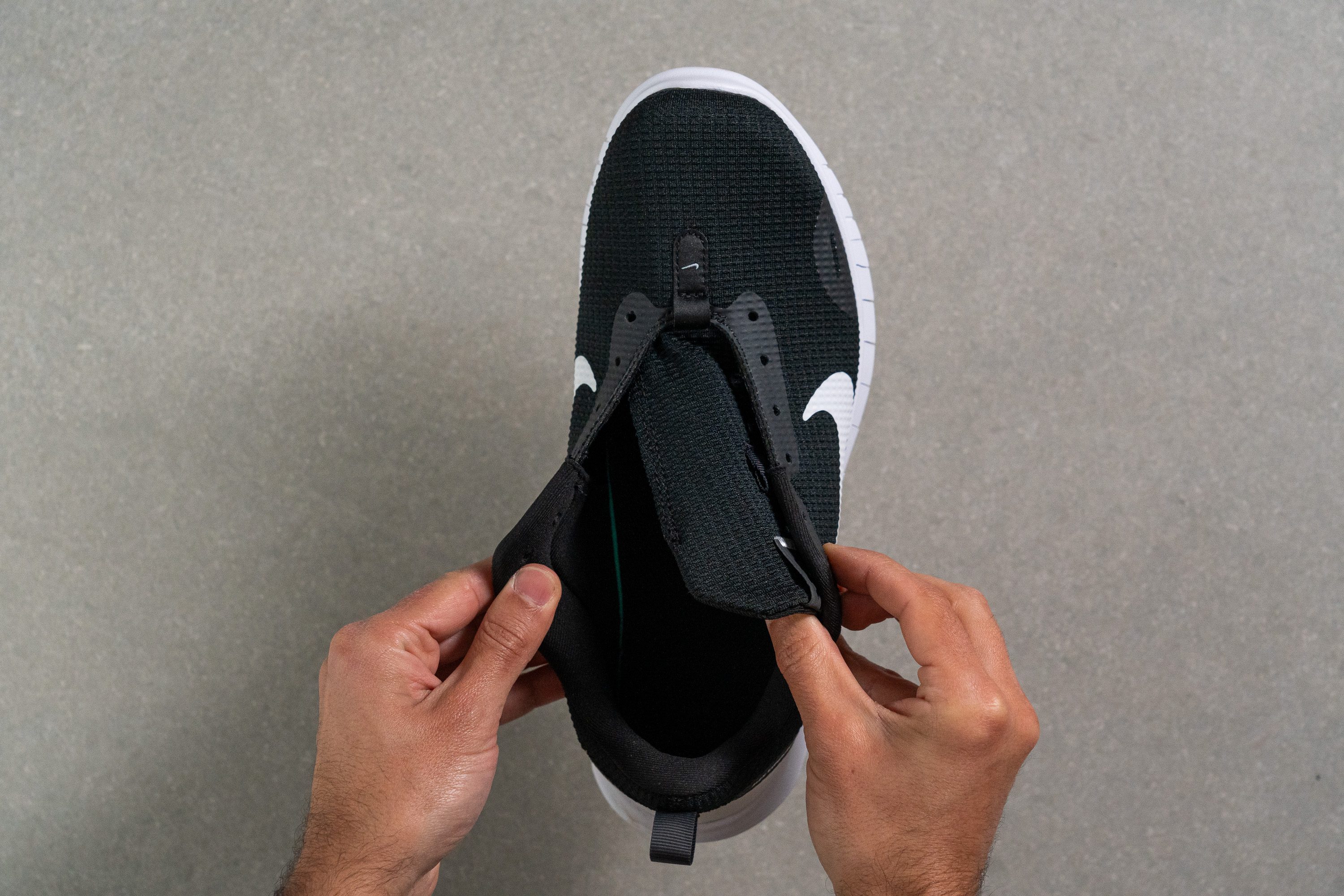
| Flex Experience Run 12 | None |
Heel tab
While that finger-loop heel tab adds a dose of practicality we love, design-wise, it kind of looks like an afterthought!
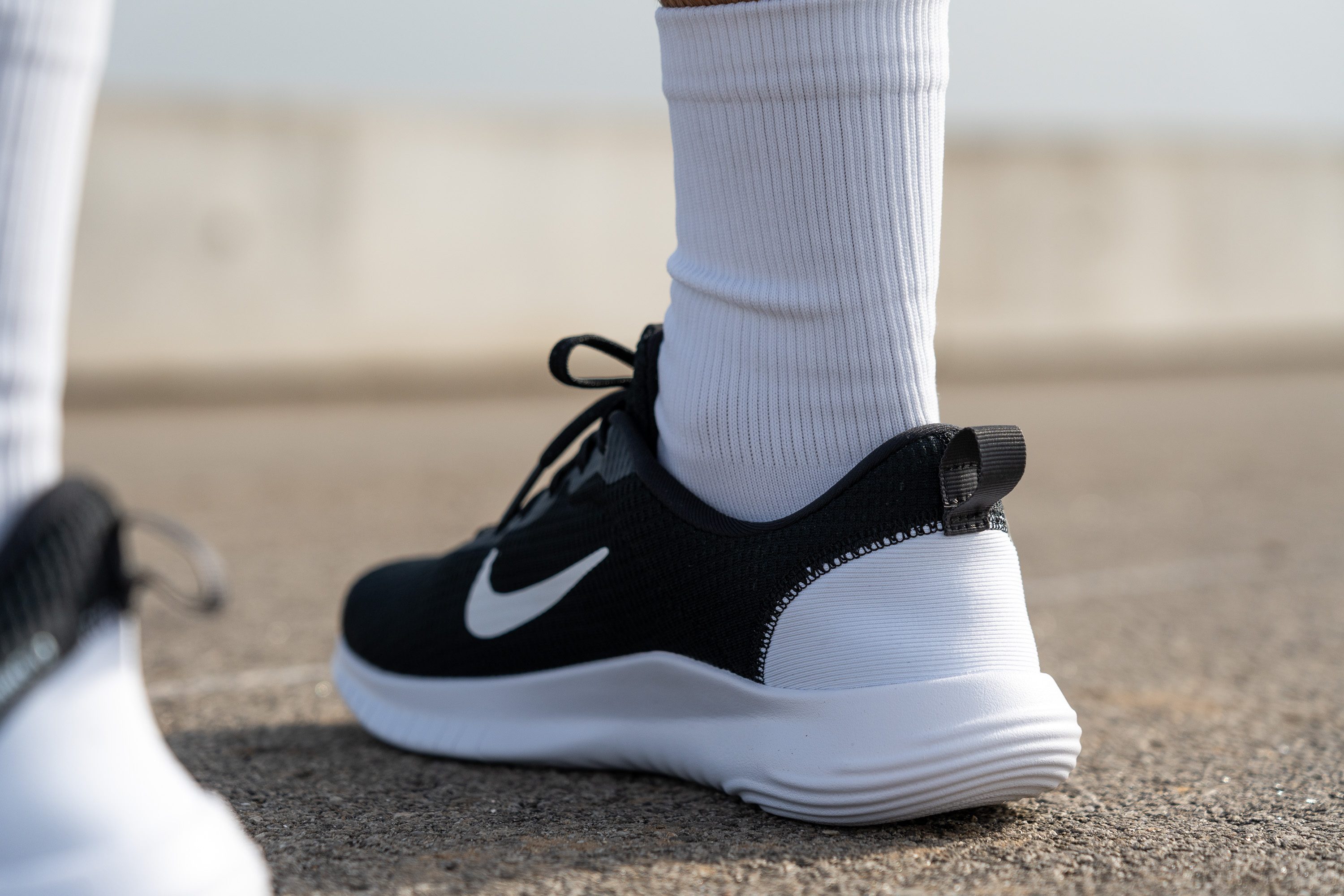
| Flex Experience Run 12 | Finger loop |

